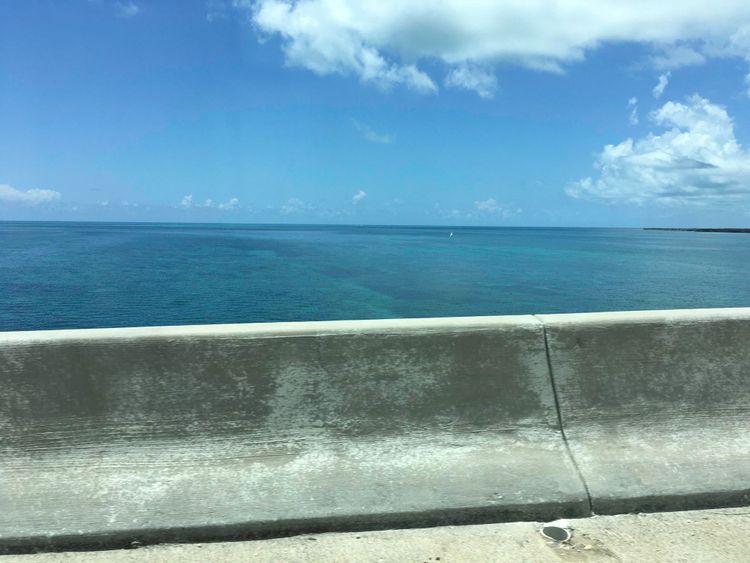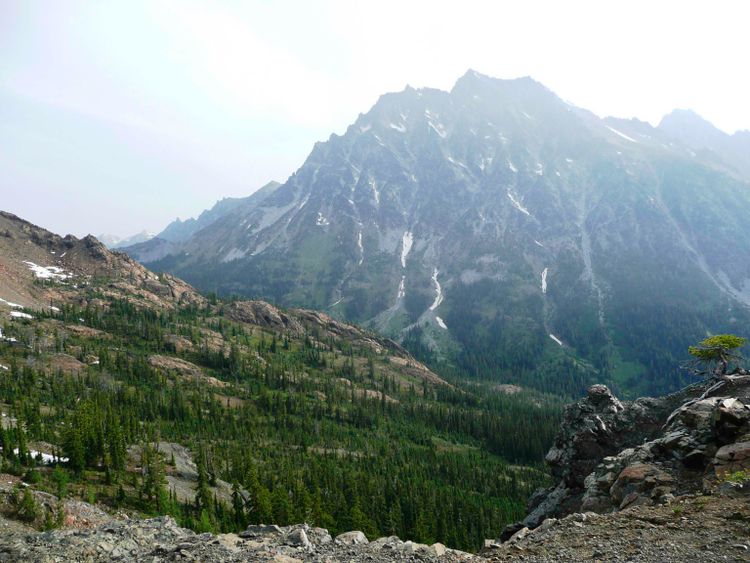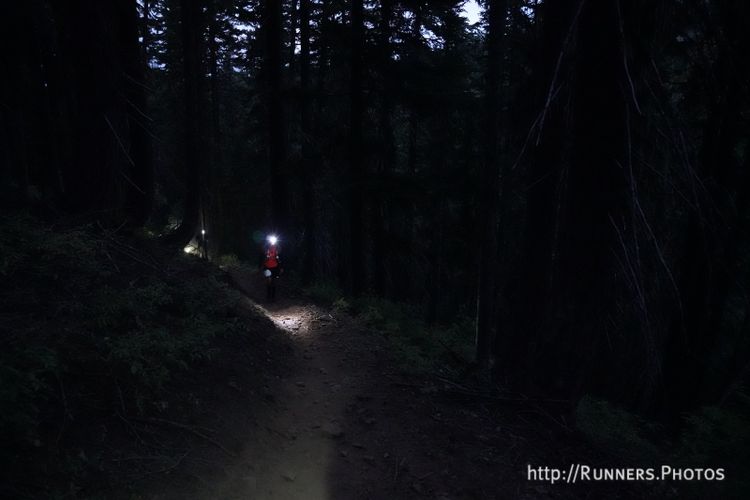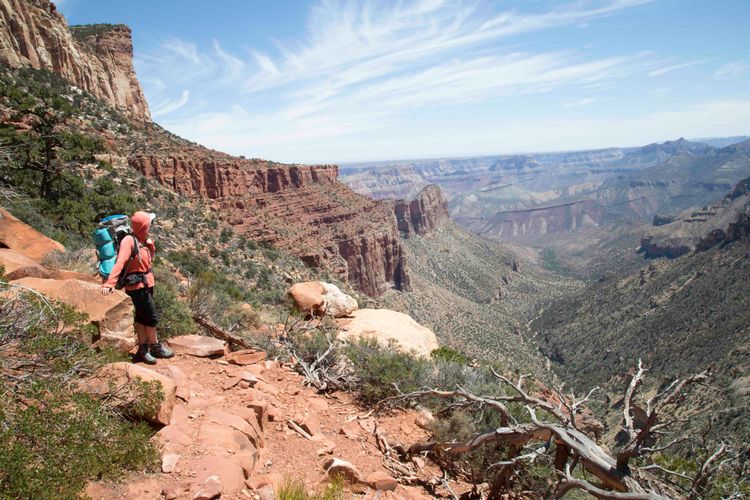Hentii province, Mongolia, July 2014
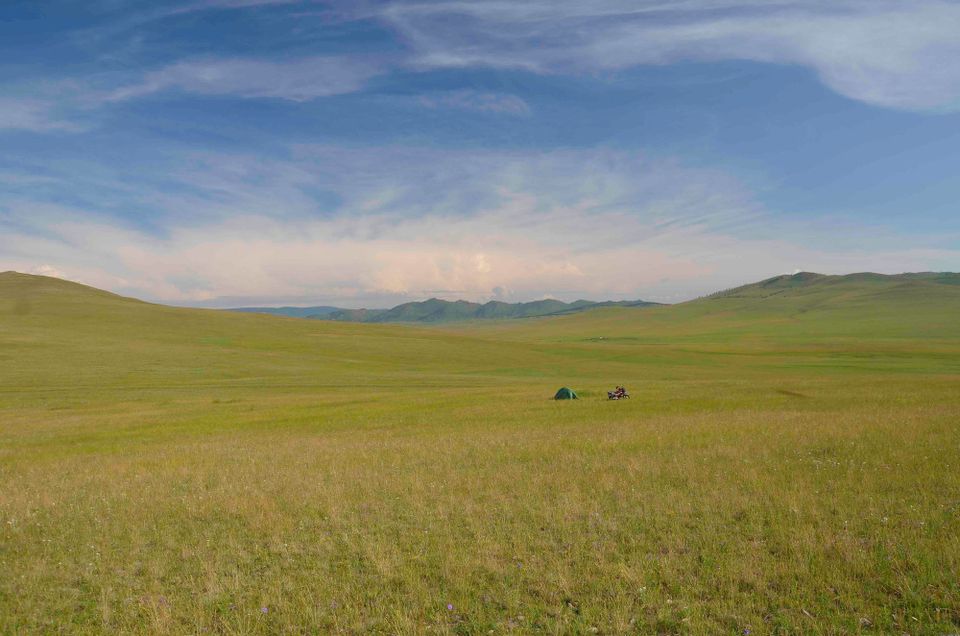
My friend Mirek and I had decided to escape Ulaanbaatar during the weeklong Nadaam vacation, when all of Mongolia shuts down for festivities. I had arranged to rent Japanese motorbikes from a friend who ran a business as a fixer for expats, but a few hours before we were to leave, he had “trouble with one of the bikes,” which turned out to mean that he had given it to a larger group of tourists when one of theirs broke down. I didn’t mind; the other bikers had flown in from out of town and I was sleep-deprived from finishing last-minute office work, so I was glad for a slower start. Mirek called around and found a little company way out past the airport to the West. The owner said she had two Chinese 150cc bikes if we could get there within an hour. We grabbed our camping gear and met at the usual corner, and a taxi took us all the way out past the airport.
The taxi drove in circles around the little town to find the place: a ger on a muddy dirt street behind the usual tall walls, owned by a pretty Mongolian woman who spoke very good English with a mechanic (her husband?) and a 40-ft shipping container full of bikes next to her ger. We didn’t have the $400 per bike that she required as a deposit (we hadn’t read the contract and she hadn’t mentioned it on the phone) and so she just said “Give me something valuable to keep,” and we both gave her a credit card. What really happened was that we looked each other over and decided to trust each other. She poured milk on the bike’s wheels to bless our trip (“I’m not superstitious,” she said, “but I was having all kinds of bad luck and I asked a shaman what to do. ‘Have you poured milk on the wheels,’ he asked? I haven’t had any problems since I started doing it.”) It rained while we were doing the paperwork and they were replacing the battery on my bike. We laughed about the rain being a bad omen (as it proved to be). Eventually the rain lifted a bit, she handed us the keys, and without further instruction we rode off, without knowing what half of the bike controls did, and me not having ridden since Namibia, 30 years ago. Wow, I hadn’t done the math until I wrote that sentence.
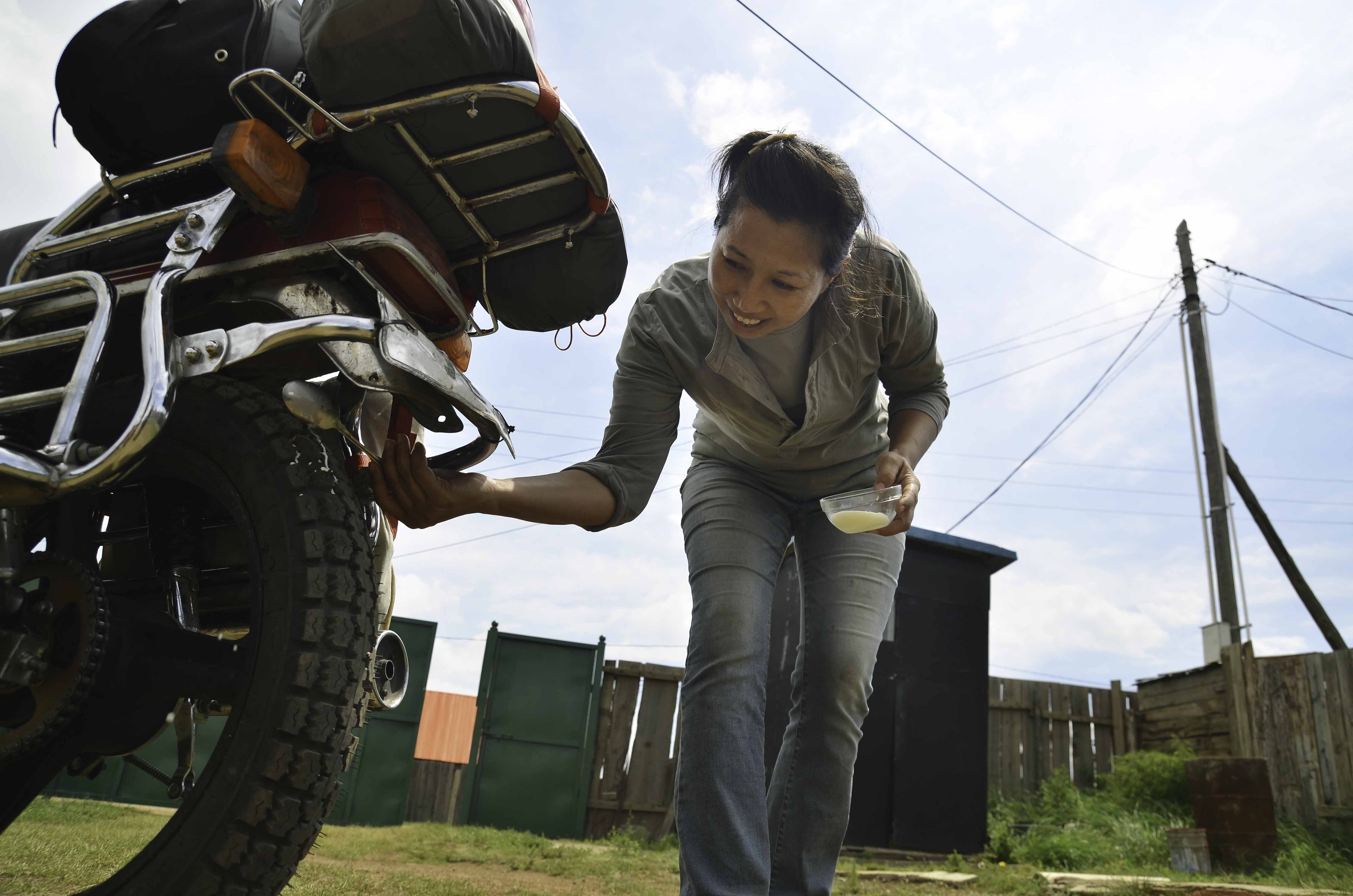
The first couple of hundred feet were a bit sketchy, but soon we hit the open road. Amusingly, one of the features that the bike owner advertised as an advantage of her location west of the airport was that renters wouldn’t have to ride through the dangerous streets of UB, but in our case we were going East, not West, so we had to ride the entire length of UB on the busiest traffic day of the year. The highway turned out to be a parking lot for more than 10 km before the city gate, and so we took full advantage of the bikes, squeezing between the parked cars, riding on the dirt road or narrow berm next to the highway, jumping curbs, and once crossing a river by driving through it, rather than taking a traffic-clogged bridge. The city out that direction is truly unpleasant, tons of garbage, dust and traffic and cows eating plastic bags, trucks full of feces-splattered sheep waiting to be sold to anyone who stops, cattle and skinny stray dogs wandering across the road; the whole deal.
Eventually the traffic opened up and we got up to maximum speed, which was about 80 km/h. I hadn't been able to find a helmet that fit, and the one I rented had a brim but no face shield, which turned out to be a bad combination. It was too big for me, and I discovered that I had to wear sunglasses and two hats under my helmet at all times to keep it from lifting annoyingly in the wind. We stopped for lunch at a little café that had the best suu te tsai (tea with milk and salt) that I’ve had in Mongolia; I ordered goulash and Mirek ate tsuiven (noodles with bits of meat and vegetables). The portions were gigantic. After lunch, we stopped for an hour or so to enjoy the wonderful statue of Chinggis Khan outside of town, where a man was letting people snap photos of themselves while holding a huge, sad-looking cinereous vulture.
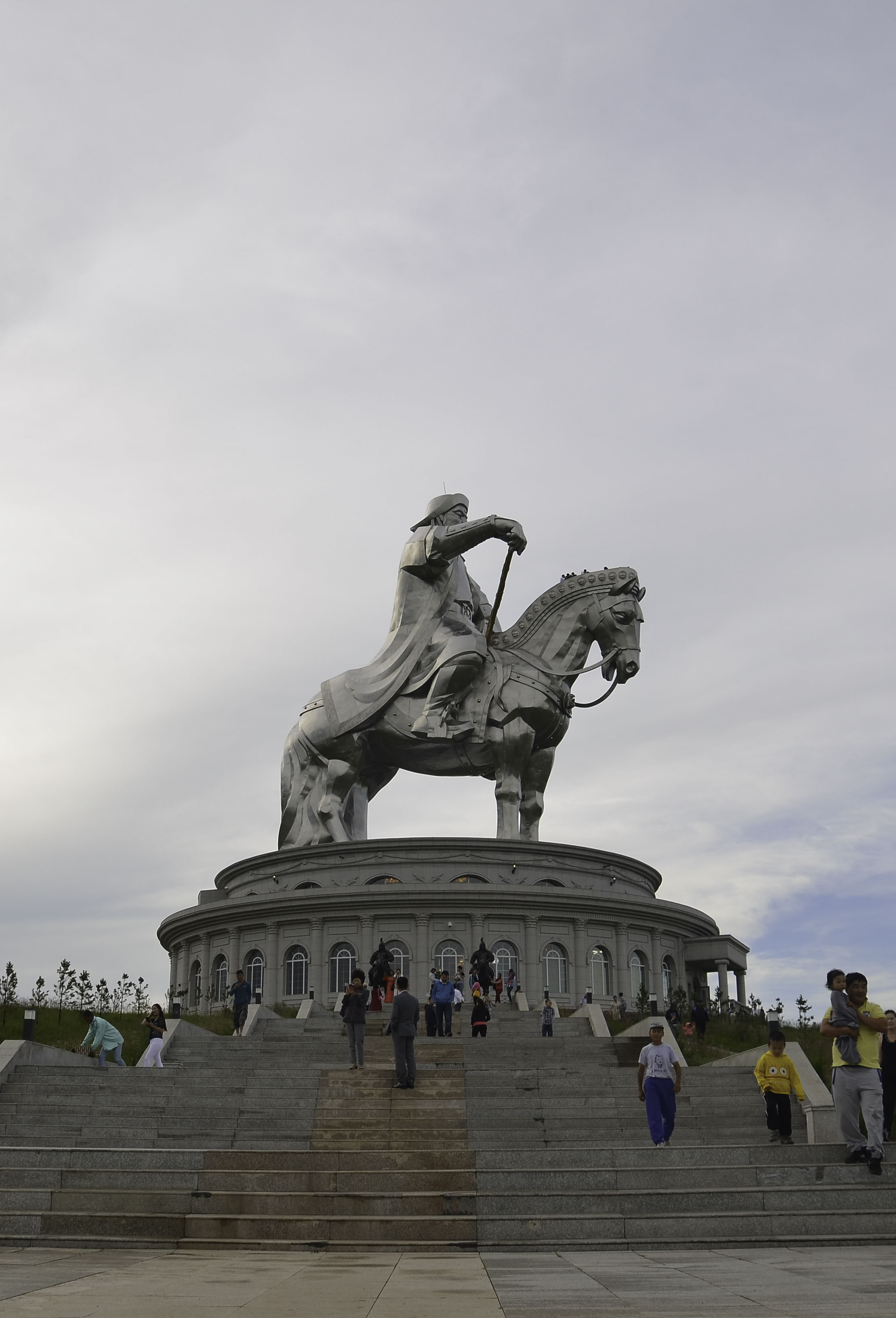
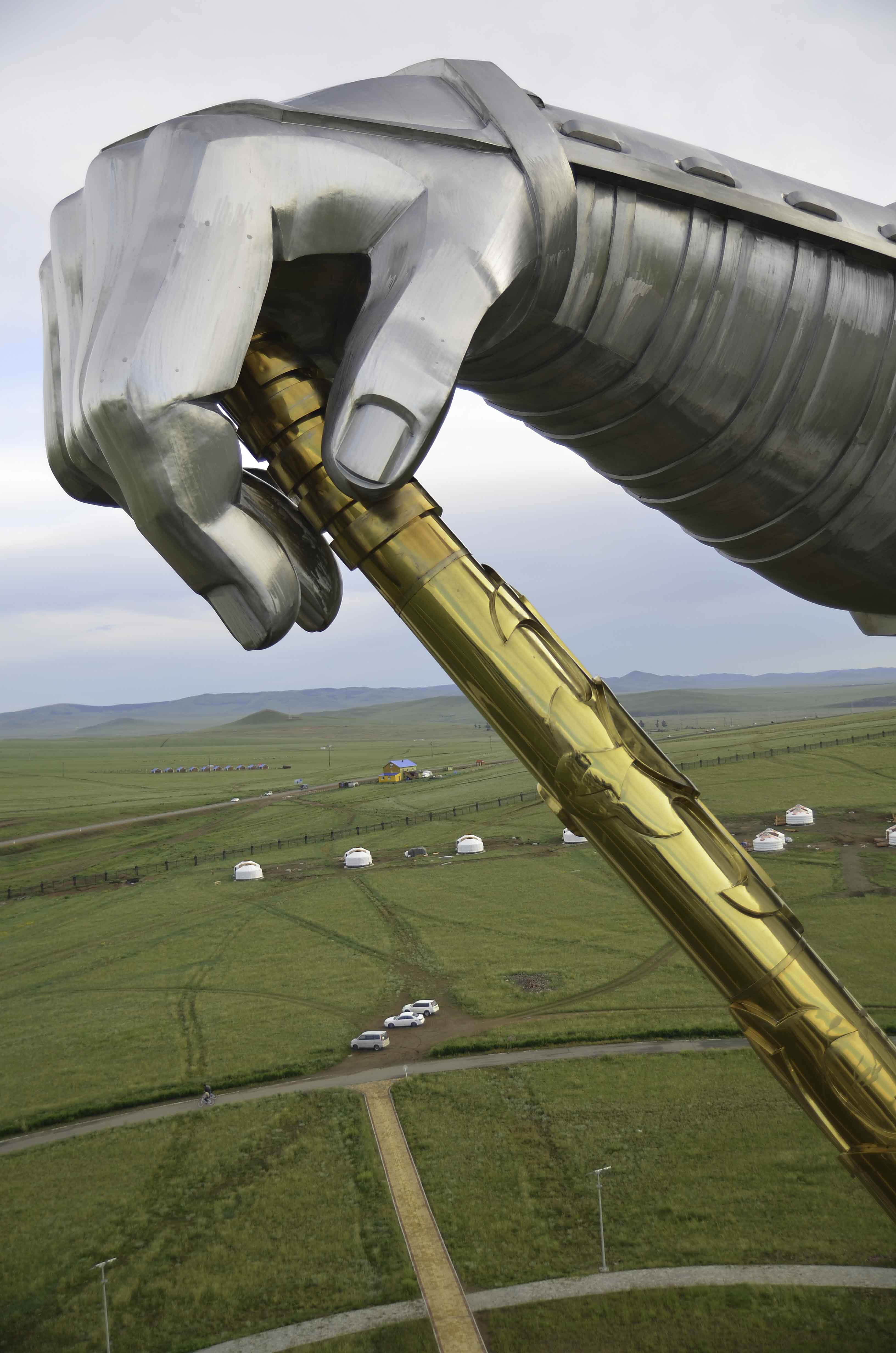
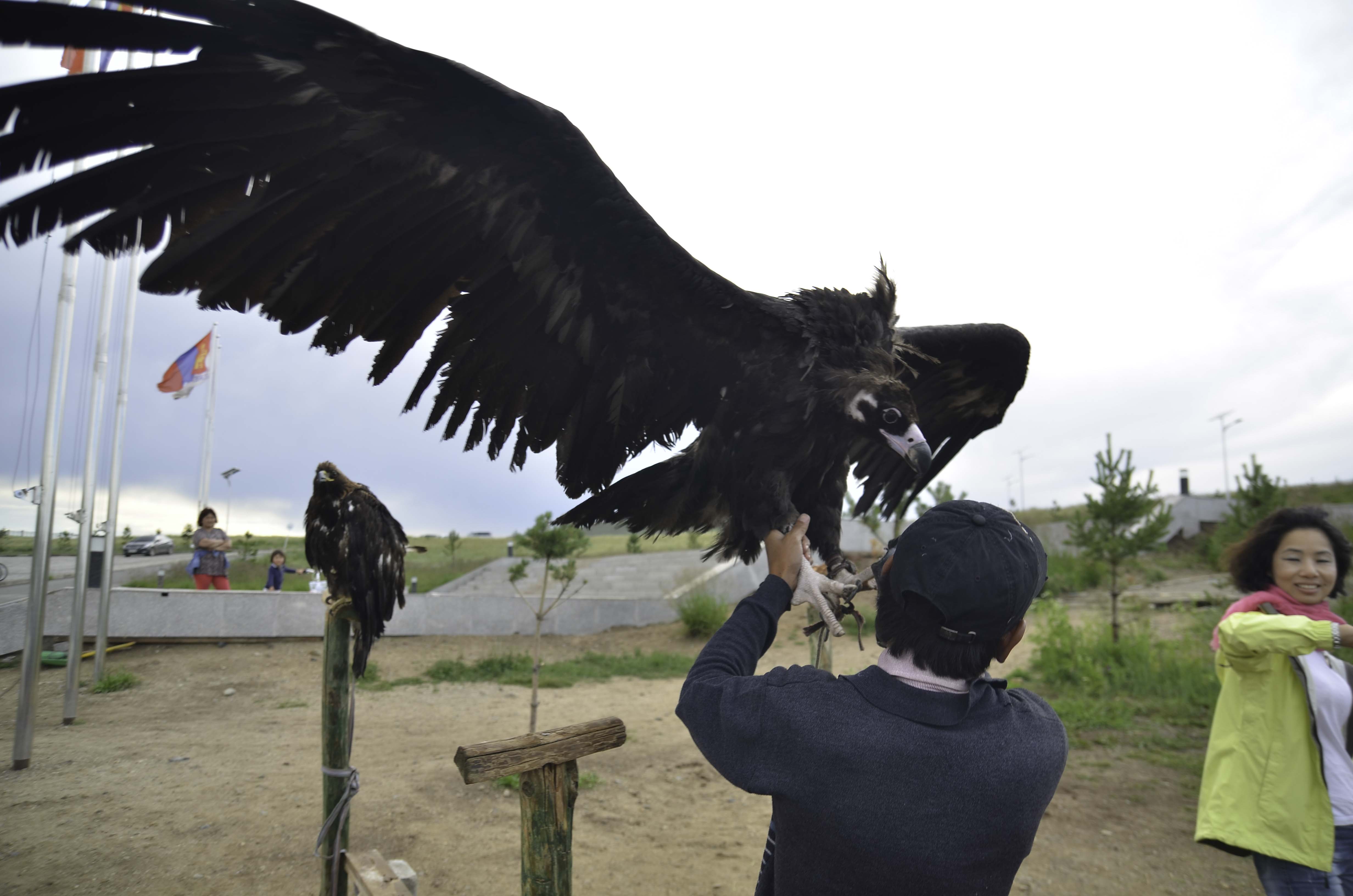
Once past Terelj, the traffic eased more and we had a glorious hour or two of riding through the mountains and valleys, sun and clouds, green grass everywhere and the wonderful smell of the meadows all in flower filling every breath. I felt ecstatically free, and I whooped with joy until a huge cloud moved over and we started seeing a lot of lightning. We pulled over to put on our raingear, just in time to ride through a shower that only lasted 15 minutes, and came back out into the sun. The road got smaller and the traffic dwindled even more, but that challenge was replaced by dangerous potholes and unmarked construction. A couple of hours of mostly wonderful riding later, we pulled off the road, drove back away from the noise of the cars a kilometer or so, and camped. Mongolia has laws that strictly limit the extent of private property, with the result that everyone is allowed to ride, drive and camp virtually anywhere. We ate leftovers from lunch for supper and I discovered that my bike had a sticker of a flaming wolf head on it, which amused us both. Mirek took longer to enter the tent than I, and when he finally came in, he was happy because he had managed to send a text message to his girlfriend. He had used the "Mongolian herder method” that a Czech friend had written about in a blog for situations where the phone reception is marginal: you write a text message and then throw the phone into the air as high as you can. “I had to throw it three times, but then it went through,” he said. We drifted off talking happily, although it had started to blow and the tent was flapping.
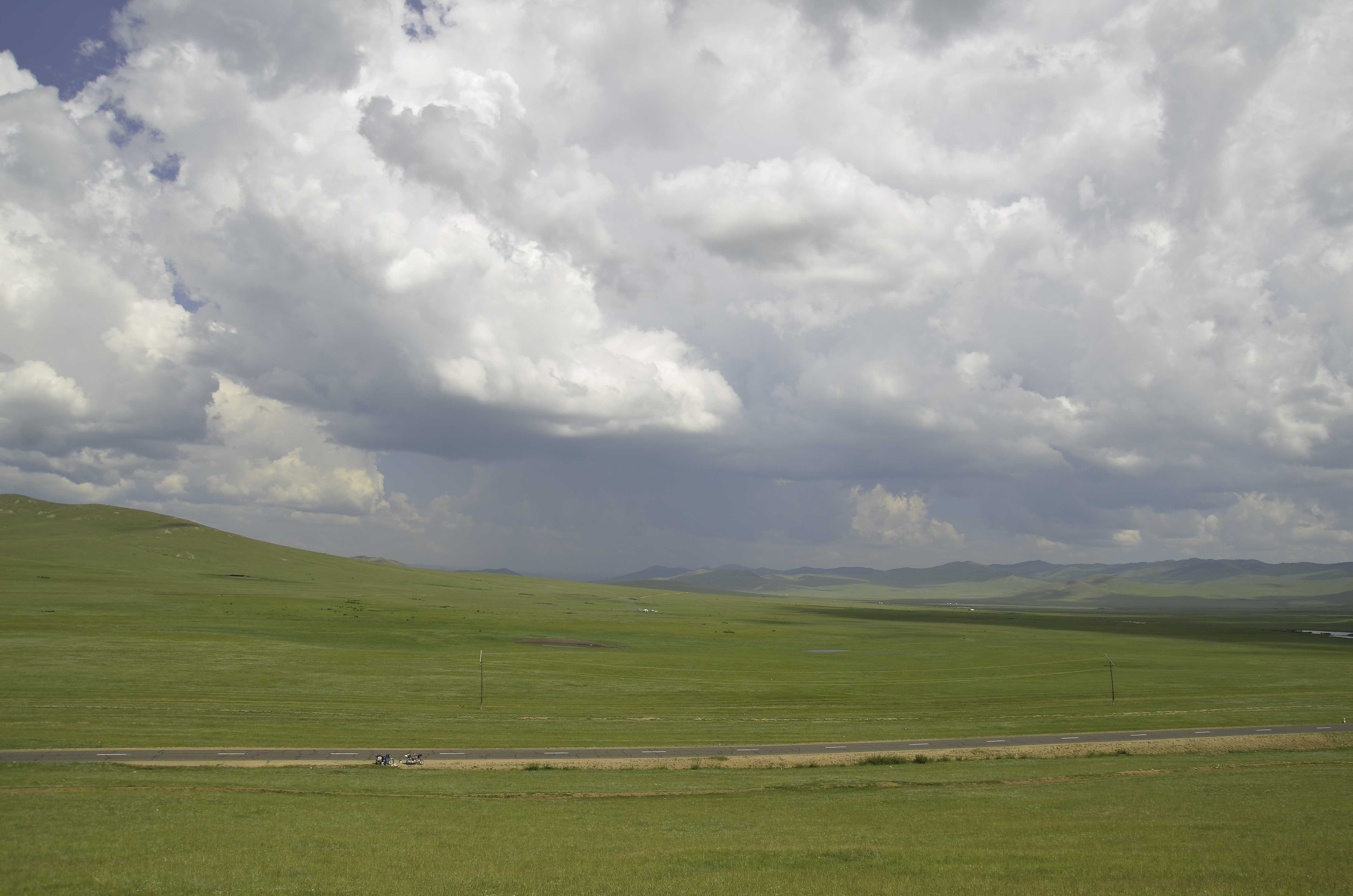
It rained all that night and the wind blew very hard. We used earplugs to shut out the relentless, noisy flapping of the tent, but in the morning, the weather was fine. We looked at the map and realized for the first time how very slowly we were going, and began to sense that we might not get as far as we had thought on our vacation. Although bikes are fast over short stretches of rough terrain, we were learning that they are a lot less efficient than cars if you are traveling long distances. It was still a long way to the Hentii provincial border, so we got underway after eating an apple (Mirek introduced me to cold instant coffee with powdered creamer, totally unhealthy and surprisingly delicious). The meadow that we were in was sunny and absolutely beautiful, full of wildflowers.
We rode down the main road along a valley which had so much mining in it that we both initially thought that we were seeing natural mesas, since we thought humans couldn’t possibly create landscape features that big. We were shocked to realize that it was actually a string of 7 to 10 mines all in a row with their mountainous waste rock piles. We roared through an ugly, large town and out the other side, across a wide river on a bridge with a toll gate where the woman manning the gate (so to speak) just smiled broadly and lifted the gate when we rode up, and on, winding through beautiful hills. Mirek’s bike started sputtering and we stopped for lunch in a little town that we thought might be our turn-off point. We looked briefly at the map and decided that it must be the right place.
As we pulled away, I noticed a tiny little repair shop across the street and decided to ask if they could fix Mirek’s bike before we hit the back country. We had almost no language in common but we understood each other pretty well, and the owner brought out his bucket of mismatched and battered tools, messed around, cleaned the sparkplug and swapped it with mine, without any success. Meanwhile I could see that the word was getting out around town about us, and pretty soon, a handsome young guy drove up in a souped-up Honda with the special rims, low-slung suspension, badass stickers and loud exhaust (a show that may have been practical for getting girls but was ludicrously impractical for transportation, given the state of the dirt roads), and he sort of pushed everyone away, took one look and drained the carburetor, after which the bike ran perfectly. The shop guy charged us $3 for the repair, and we left the main road and headed up the valley.
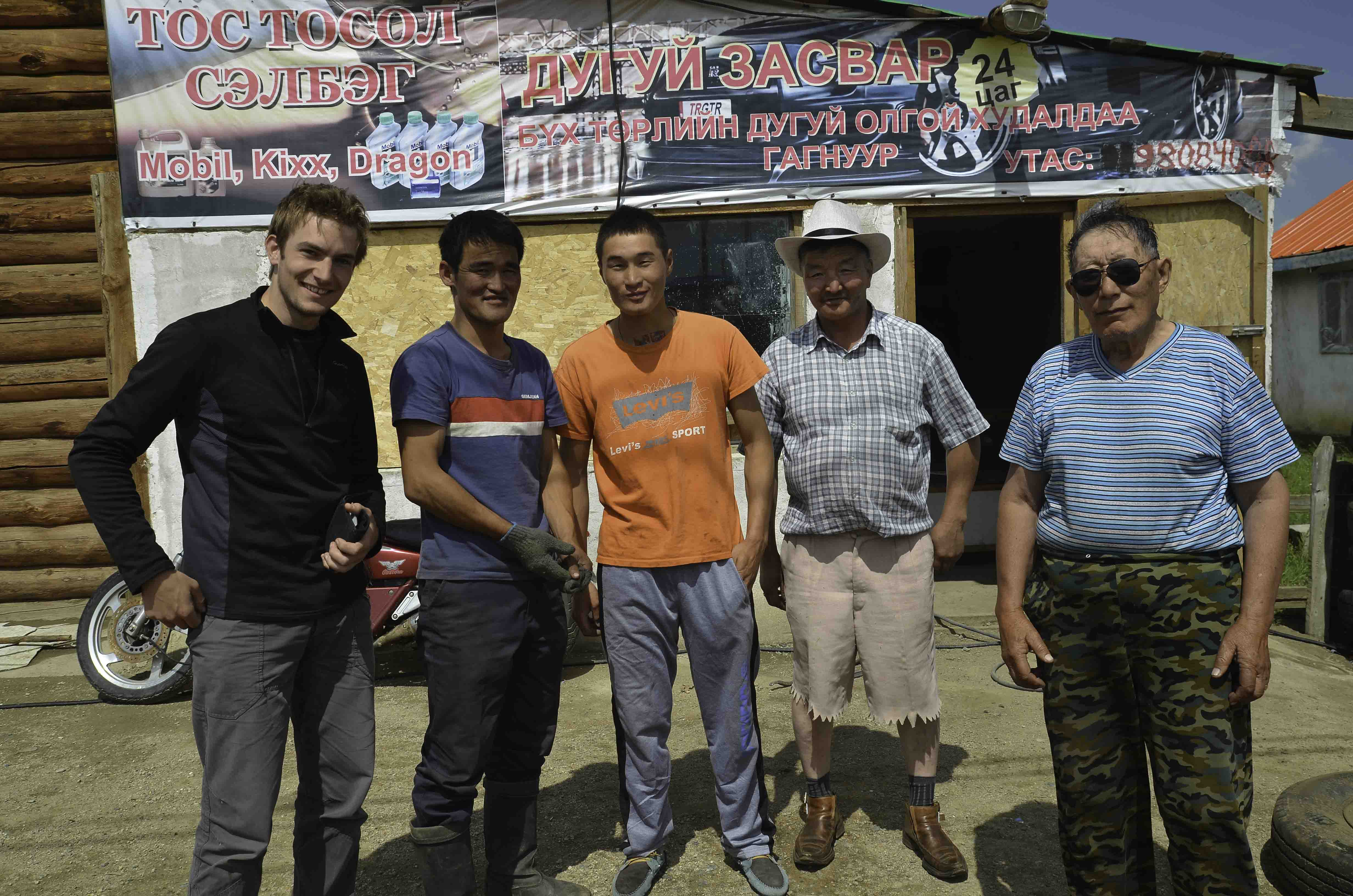
The road very quickly got smaller and we were in a steep valley clogged with piles of waste rock from a major mine. The mine seemed to be abandoned and the road kept getting more overgrown, thinner and wetter, and we met some aggressive dogs that chased us for quite a while. We stopped to look at the map but it seemed as though we were roughly in the right place so we kept going, up and around the corner, up and around the next, always wanting to see just a bit further. By the time we finally reached a pass about 1000 ft higher, it was clear that we had made a navigational mistake because the road had not been used in a very long time. Clouds had come in again, with lightning, and it was raining on and off.
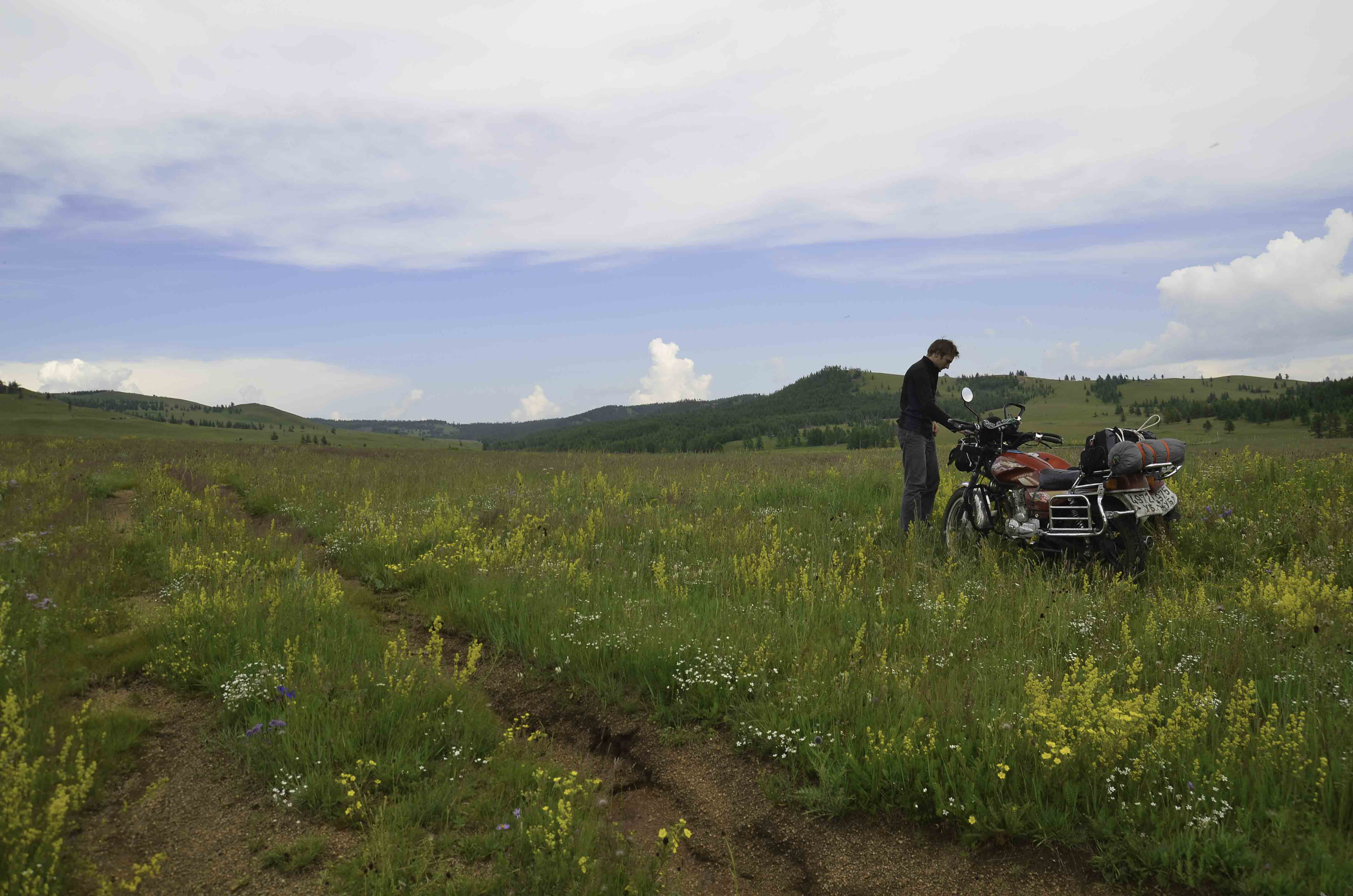
Both of us, I think, had pretty major reservations as we started down the other side, but worse weather was threatening and the bugs were bad, and we didn’t want to go all the way back the way we had come. We plunged steeply down the side of the mountain through forest (logs across the road now became an additional hazard) and the grass and tall weeds were up to my shoulders as I felt my way down. At the bottom, the road went straight into a swamp. I decided to follow it and try to muscle my way through, and a couple hundred feet later I ploughed into a hole that was about thigh-deep and came to a sudden dead stop. To add to my unhappiness, I discovered that my chain had fallen off. Both boots were full of water by this time, so I just got down in the mud and water and put the chain back on by rocking the bike backwards. With huge effort, I got it out of the hole into water that was only axle-deep, and progressed a few more feet before hitting the next hole. Mirek was also struggling, only without the added chain annoyance.
Within an hour, we had discovered that we were in a high-elevation valley that was completely filled with swamp from side to side. We could see about 2 km before it went around the corner, and the entire thing was a bog, perfectly green and luscious. I am not sure if I have ever been in a place with worse flies. They were as bad as Alaskan mosquitoes, only this was a mixture of little flies and horseflies (about 70/30 by volume). They loved the bike and my legs and helmet, and were so dense on my back that you couldn’t see the fabric in patches, but luckily didn’t succeed in biting too often because they were stupid about where to try. When I stopped to pee, a horsefly brazenly tried to bite my penis.
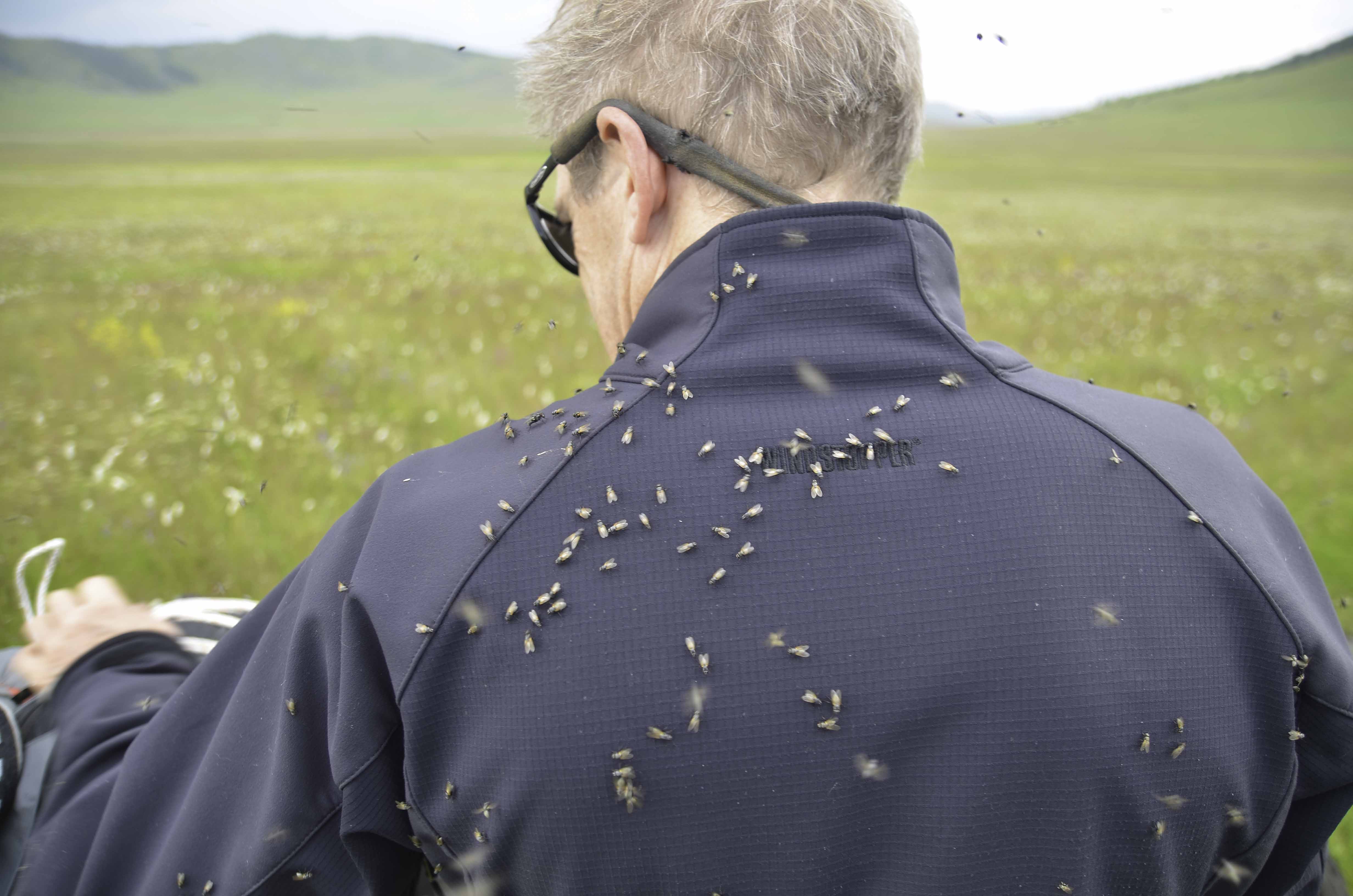
We fought our way through the bog for what must have been the better part of two hours, inching along from hole to hole through water that often covered the axles, stalling and restarting the bikes, gunning them across a flat patch and then plunging into the next hole, hauling the heavy machines in and out, rocking mine back and forth to un-jam the chain and get it back on the sprocket again. Except for one distant ger, there was no sign of human habitation in this remote valley, and in the middle of this heaven/hell, it was surreal that throughout our ordeal we were surrounded by a flock of curlews the whole time. At least 20 of the beautiful birds with their delicate wings and long beaks circled us, crying continuously. We also saw a pair of cranes with chicks and a lone osprey flapping by on a solitary mission. I think we were probably in the middle of a biological oasis of some significance, and it occurred to me that we were probably disturbing important nesting habitat. However, the struggle to move ahead and survive the flies was so intense that I had no time for the curlews except to look up in wonder from time to time while I caught my breath.
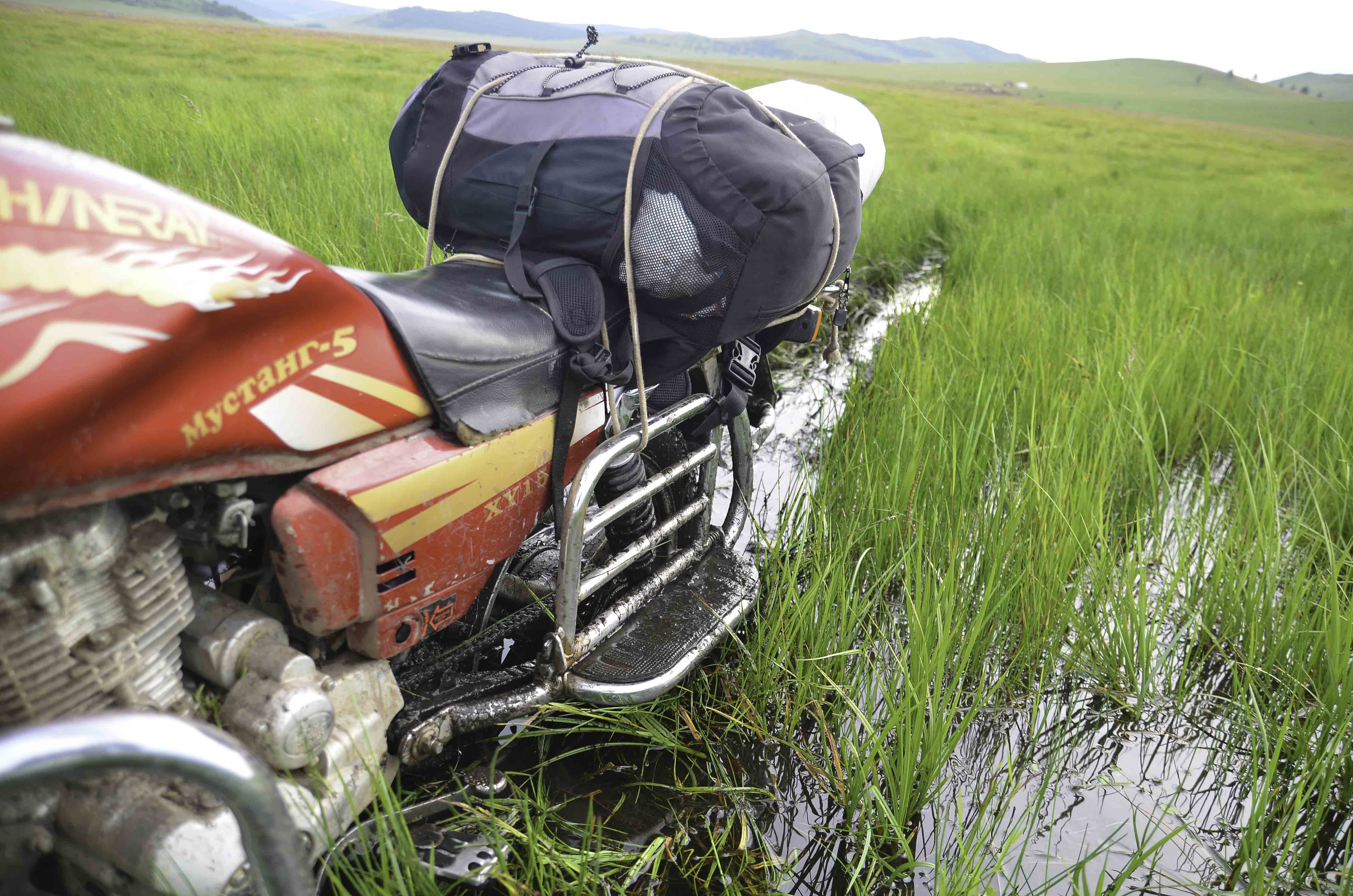
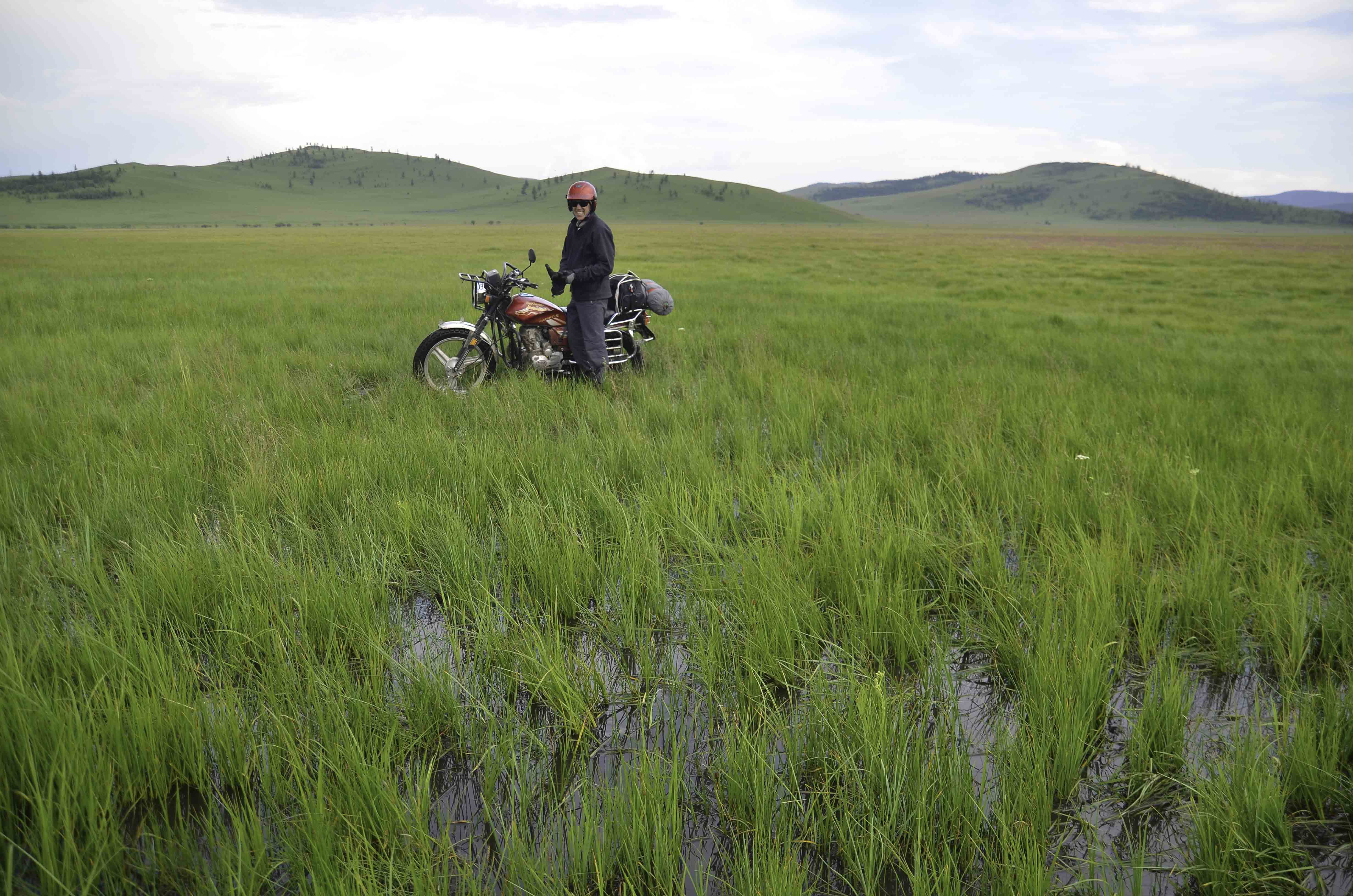
Neither of us had wanted to stop to fix my chain, given the density of flies, but the chain problem was tripling my effort and I finally lost my patience after maybe the 10th time that it popped off at a critical moment when I most needed power to get through a deep spot, and asked Mirek to come help me. We hauled the bike out of a waist-deep hole where it had gotten stuck, into shallower water so that we could properly fix it. We knelt in the water, batting flies away, and figured it out, piece by piece; how to adjust the tension, how to center the wheel, what to tighten and what to loosen. Facing the problem and prevailing made us both feel a bit more emotionally empowered, and we soon made it from that spot to a slightly higher ground (a little hammock with dead trees, still submerged, but not as deep), and finally to the swampy and totally unused continuation of our road, which ran along the valley floor. We rode as fast as we could for the next hour, and it was like something out of a B-grade horror film to be going 40 km/h and look in my mirror and see the flies right on me in a big cloud. When I hit the brakes, they would surge past me, then turn back, and they would try to ride on my jacket when I really got going, so I was waving my arms trying to ride the single-track as fast as possible and to knock them off at the same time.
By this time, we were really uncertain of where we were, but we were happy to be moving, and hadn’t stopped to find out because of the flies. About 20 km down the valley, we ran into a Land Cruiser carrying three guys wearing camouflage and a couple of kids. They were hunting marmots. They were bringing one guy back to where he had parked his motorbike and he had a floppy, muddy, bloody marmot carcass strapped to the fender, as he proudly showed us--it seemed especially unappetizing to me, considering that marmots carry the plague in Mongolia. One of them spoke a smidgeon of English. They pondered the map for quite a while and eventually told us that we would come to a very small town if we kept going, but that our goal, Batchiret, was 120 km away. We were starting to worry about running out of fuel and we were almost out of drinking water, so the news wasn’t reassuring. The flies were so intense even down at that elevation that our conversation was brief, and we soon rode on.
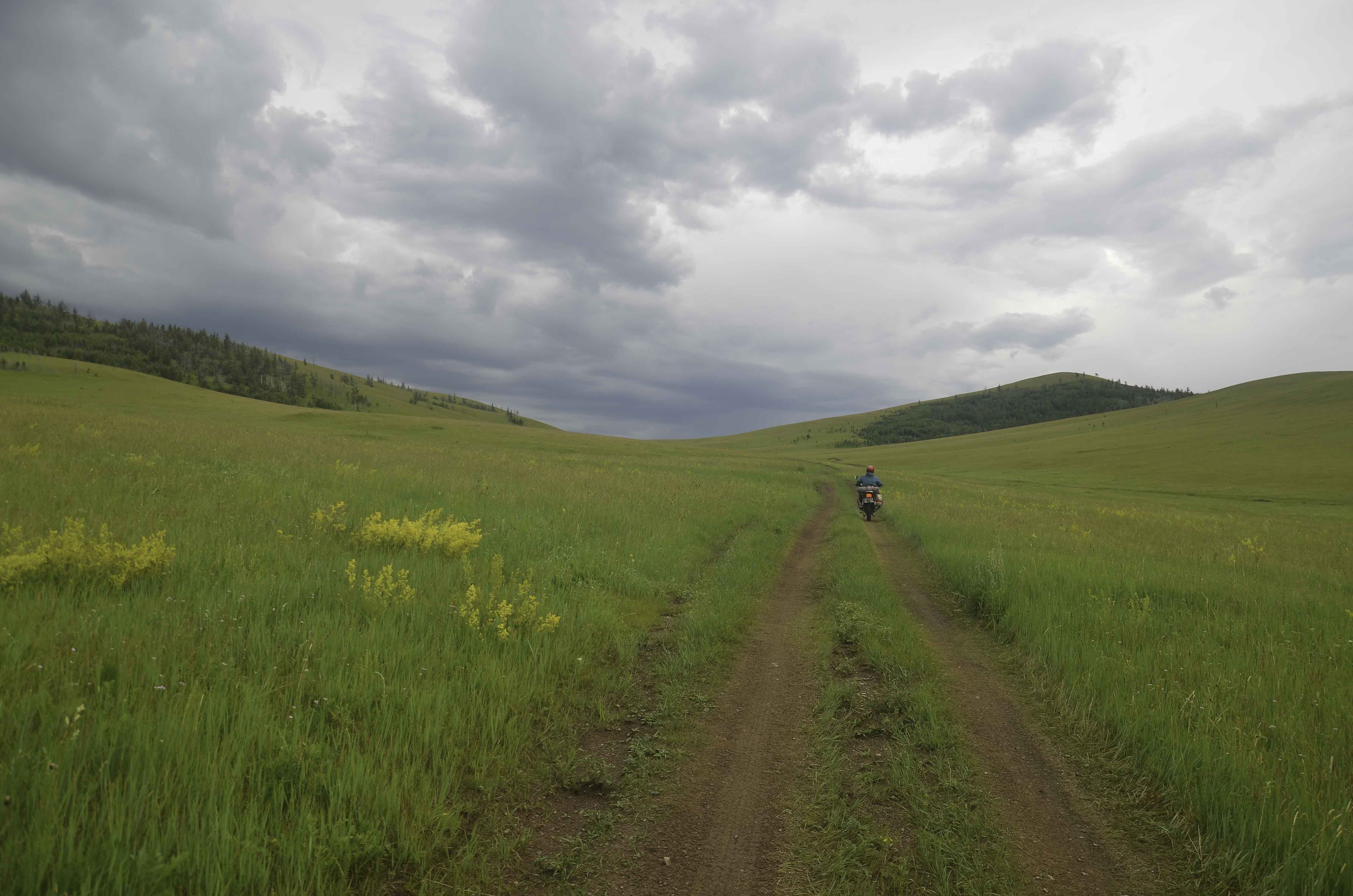
By the time dusk fell, we had gotten down into a huge, wide valley and the flies had eased a bit. We were running along it on a road that crossed streams and swampy spots again and again, but was manageable overall. We had seen a couple of lonely gers, so we knew that we were in a slightly more inhabited area than we had been, but it seemed as though we were probably still a very long way from any town. In the last valley, we stopped to ask directions and met a strange scene with two women and a surly, scarred young man with a criminal look about him who only glared at us. He was rocking a baby in a baby carriage outside a ger, and the carriage seemed almost incomprehensibly out of place in that sea of mud, more than 100 km from any paved surface. Once or twice, dogs had chased us as we passed a ger, and as we left his place, I had quite an experience with two very large, thin dogs that looked like wolfhounds of some sort, who raced along next to me baying and looking like they were going to bite me. Their speed was incredible and even laying on the throttle I couldn’t get away from them on that potholed terrain. I got a sense of how daunting it must be for a deer or elk to be run down by wolves, but after a while, I decided that they were probably too busy running and barking to actually bite me.
By this time, we had both fallen a couple of times at low speed because the bikes were heavy, underpowered, and awkward to maneuver, and were very squirrely in mud. The roads were rutted, and on hills they were eroded into deep gullies. You would be going along fine and then all of a sudden you were teetering on the edge of a gully or the bike’s rear end was sliding around in soapy mud. Our falls had bent some parts of the bikes already, but the bikes were tough, and most parts could be unbent just by kicking them. We were soaked from the waist down and muddy from falling, and ever since hitting the swamp we had encountered one stream crossing after another, so before long we hardly hesitated before riding full-bore into water. We learned that you have to put it in low gear, gun the engine, hang on, and fight, because you can’t see what your wheel is going to hit, and you often slam around between rocks, or hit holes or mud. Only momentum and balance can get you through. At dusk, which didn’t come until 9:30 PM, we rode up high onto the shoulder of a mountain and pitched our tent, ate a small dinner: a Clif bar, an apple and hruskovica (delicious Czech pear liqueur that Mirek’s uncle had handmade back in the Czech Republic), hung our boots and socks upside down on the motorcycles, talked and laughed a bit about our trials and fell asleep, completely exhausted physically and emotionally. I made the decision not to worry about the next day, and fell asleep quickly.
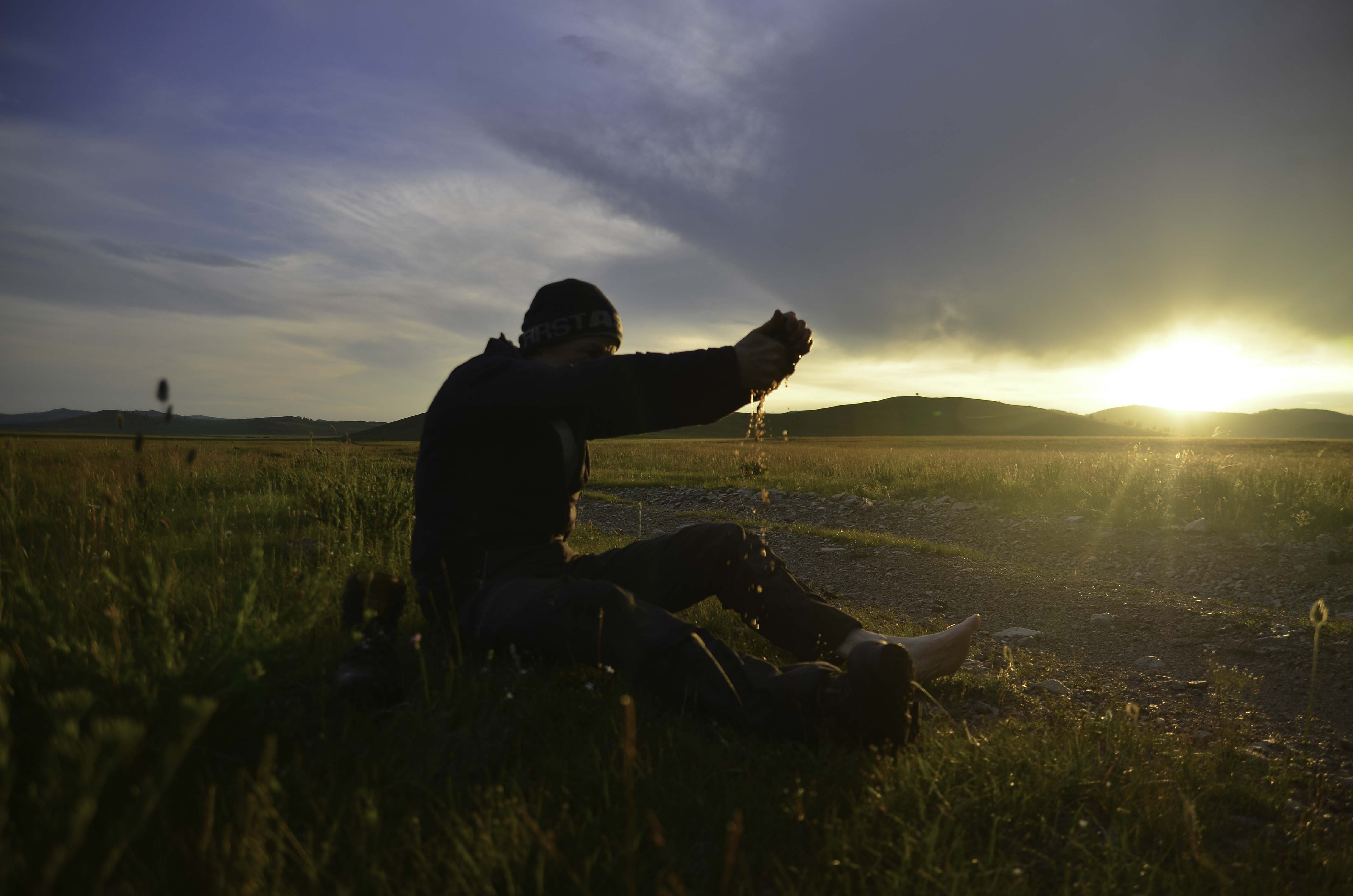
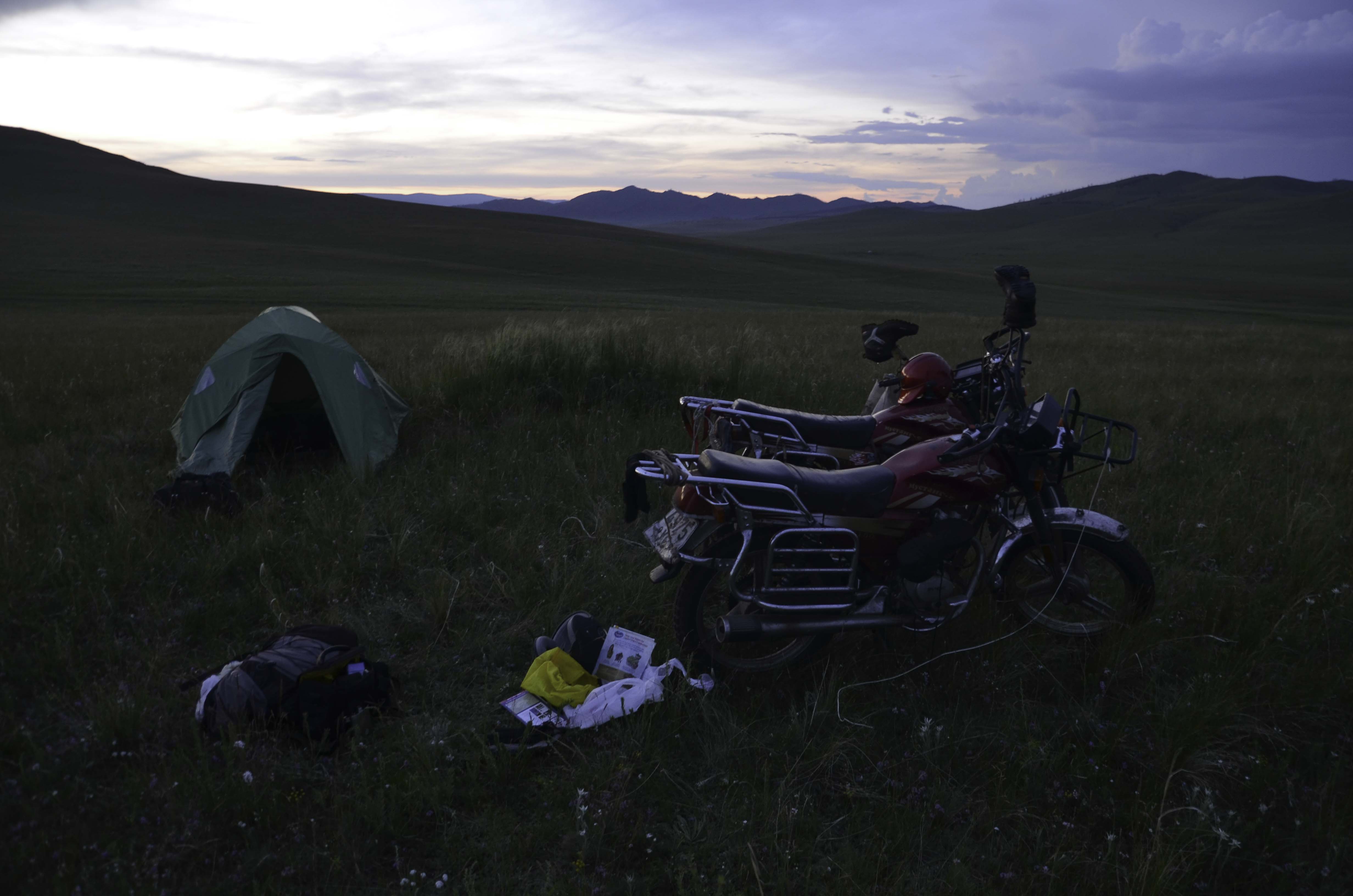
In the morning we finally took a GPS reading and saw that we were 20 km or so from a tiny little town that might have gas and water. The sun was shining and the hills were beautiful, and a picture-perfect herd of horses visited us, grazing intermittently, tossing their heads, swishing their tails and manes, pushing and rubbing against each other, whinnying, sorting out little status differences, and obviously just being curious about us, since the grass was uniform as far as the eye could see and there was no real reason to approach us. One of them was branded with a swastika, which was an ancient Buddhist symbol long before the Nazis co-opted it, and is still very commonly seen in Mongolia. Our spirits raised, we ate some nuts and cold coffee and packed up and hit the road. I fell within a few minutes at low speed and it took the edge off the fun, and shortly thereafter had a major fall at speed when I hit a head-sized boulder hidden in grass and went down so fast that I hardly knew what happened. I sprained my thumb (about half of my hand is now turning purple), bruised my thigh and broke the mirror, an unhappy reminder of my incompetence for the rest of my trip. However, Mirek was tooling along confidently and we only had 20 km to go, so I just gritted my teeth and kept going.
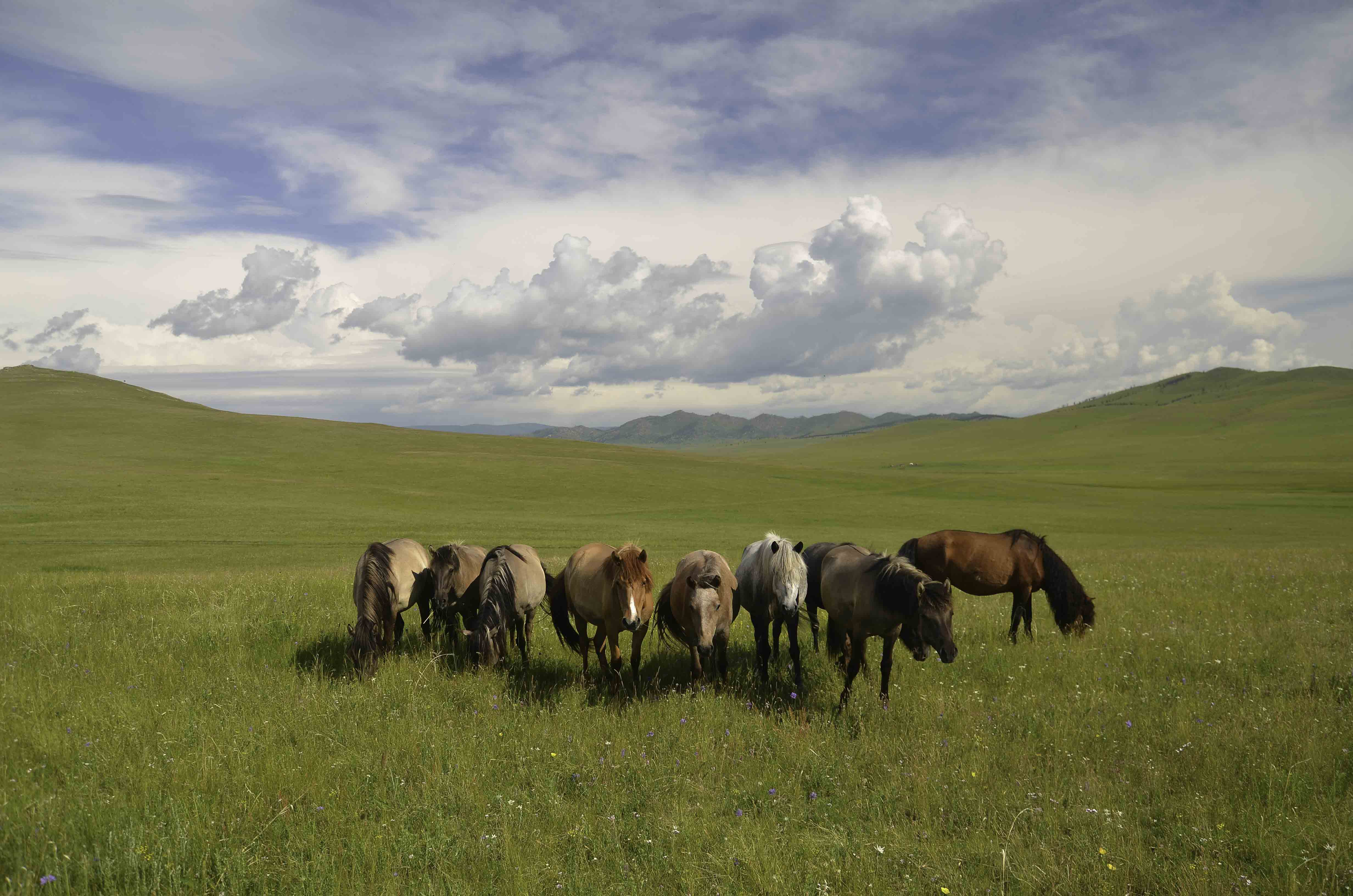
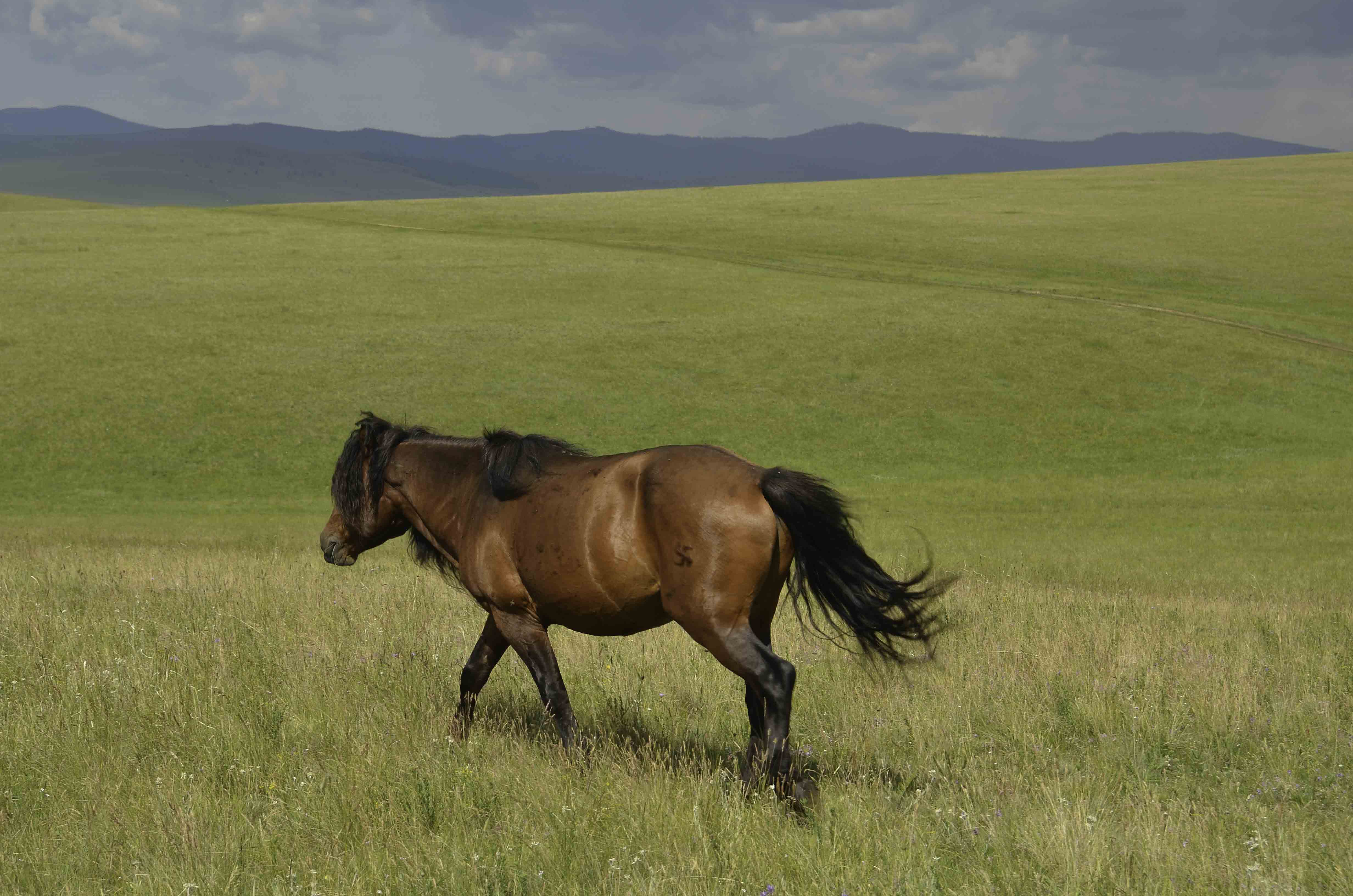
We finally found the little town (which like other Mongolian towns with their colorful wooden houses, wood fences, muddy lanes and cows reminded me exactly of towns in the video game Oblivion), and to our delight were able to buy water and gas and to have a meal. I ordered Xar Shol (Black Soup), feeling bold enough to experiment, and got a few lamb bits in salty hot water with an almost unbroken layer half an inch thick of chunky lamb fat floating on top. It was quite delicious. We left town, the sun shining, and headed down the immense valley, only 89 km to go to the big road.
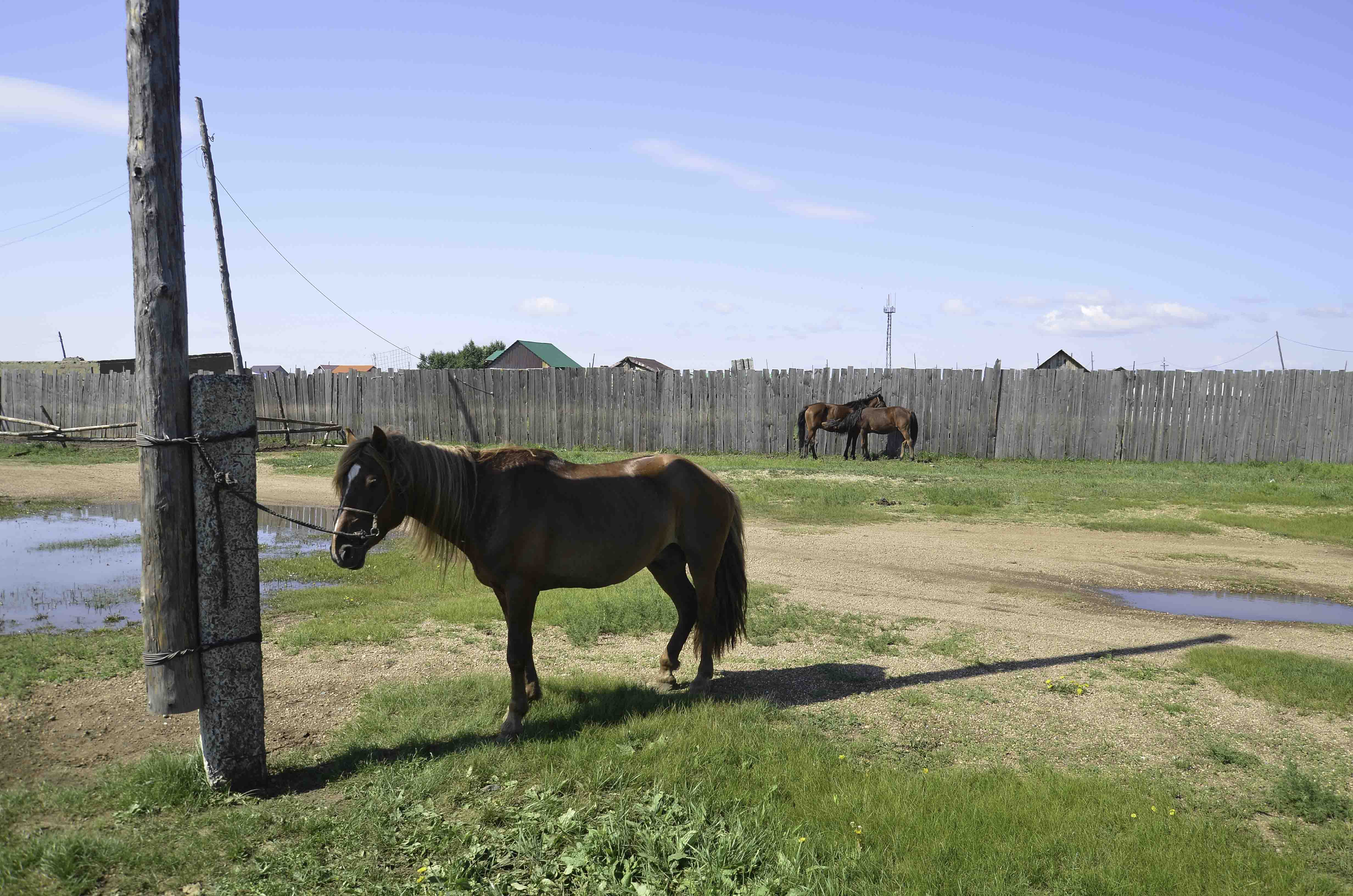
The valley was extremely wild and beautiful, only a few gers here and there in the great distances, herds of cows and goats and horses speckling the landscape, but the riding was the usual mixture of muddy, crisscrossing dirt tracks, long puddles and stream crossings. We were both fairly confident by now and so it was a surprise to both of us when Mirek hit a huge patch of soapy mud with thin, bright-green grass growing through it and went down hard, kind of half-hopping, half-falling over the bike as his momentum ebbed (“I think my leg hit pretty much everything on the bike, including the mirror,” he said afterwards). We became very wary of those bright-green spots, which were almost as slippery as ice. We picked up his bike and rode on, a bit sobered by the prospect of almost 90 km of muddy roads ahead, and about 10 km later we were forced to stop again when I hit a marmot hole (an occupational hazard when riding in the grass to avoid the mud) and my exhaust system came loose with a roar. One of the two nuts that holds the exhaust manifold on had come off and the other was very loose. After some discussion we decided to borrow a nut of the same size from a not-as-critical piece of Mirek’s bike and then ride on until we came to a town that might have a replacement.
It was then that Mirek discovered, to our dismay, that the minimalist took kit in the green canvas wrapper the bike owner gave us had fallen off his bike somewhere back towards the last town. We didn’t want to turn back but the tools were too critically important to lose, so Mirek rode back to look for it. There were storm clouds around us but the sun was fully overhead and it was hot and humid. The valley was about 20 kilometers wide and at least 100 km long, and there were at least 20 dirt roads braiding along it. Although it seems as though you can see to the ends of the earth in such a place, it is actually very easy to lose track of someone, because what appears to be flat is actually ever so slightly undulating, and even a 2-meter swell will totally hide a person or a bike or a herd of horses, so we were both a bit apprehensive about splitting up. I spent about an hour in the broiling sun, walking along peacefully and listening to wind and birds and crickets and a herd of nearby goats bleating, while searching fruitlessly for the lost nut. I left my helmet on to protect me from the sun (I had lost my sun hat two towns earlier, much to my unhappiness), but only livestock were around to see me looking like Dark Helmet.
Eventually I began to wonder what had happened to Mirek, so I packed up, finger-tightened the remaining muffler nut and went in search of him. I found him about 5 km down the road, talking to a family of four who were all traveling on one motorbike. Mirek had found the tool kit many kilometers earlier, but his throttle cable had snapped on the way back to me. The family was heading to town, and they agreed to show me the way to a shop back in town that might have a replacement cable. Mirek and I removed the broken cable and I headed off following the family: dad, two kids, and mom, all on one bike. I watched how the dad rode, since he was obviously a stone-cold expert, and it was interesting – he was slow and careful and never touched mud, just went up into the grass instead. We stopped in town by a narrow dirt alley. He went in and emerged after a few minutes with a skinny old man in a filthy, beige del (traditional robe) who looked at me wearily and without any enthusiasm and opened up his tiny shop, hardly bigger than an outhouse. It was stocked, as it turned out, with hardware—a few grimy boxes of nuts and bolts, a random collection of gears, some shiny bits of chrome, and other miscellany. The shop owner had something slightly scary and wizardly about him; he was silent and judgmental in a strange way. The two guys discussed the problem and off the shelf came (on the second try) — miracle of miracles — a throttle cable that matched mine perfectly. That, right there, is the advantage of riding the same kind of bikes that the locals own. I bought two nuts for the exhaust and 4 lock washers (just for good luck), and the total, including the cable with its complicated attachments, came to about $1.40. I still can’t understand how that is economically possible. I was very grateful, but while I was still buying parts, and before I could express my thanks to the father, he had gathered his family and ridden off.
I rode back alone out the long, wide valley past the cows and mud puddles, through the treacherous slick patches and found Mirek where I left him, stripped to the waist and sunburned, taking pictures of flowers. We were happy to find each other, and on the second try we fixed the bike, following the pantomimed instructions that the father had given us, and headed down the valley again. The mechanical problems had cost us about 3 hours and we had a long way to go, but we figured that we could make pretty good time.
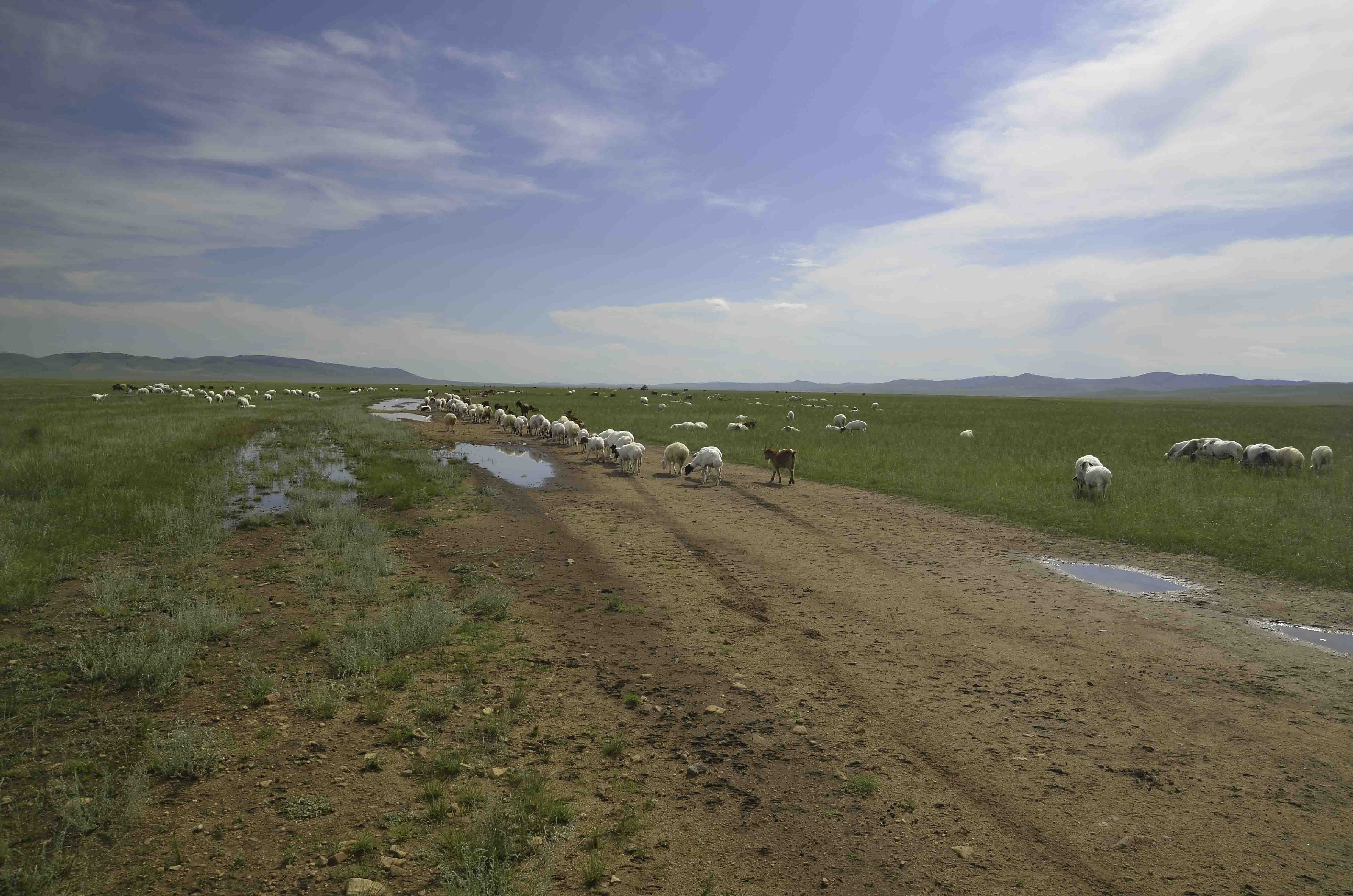
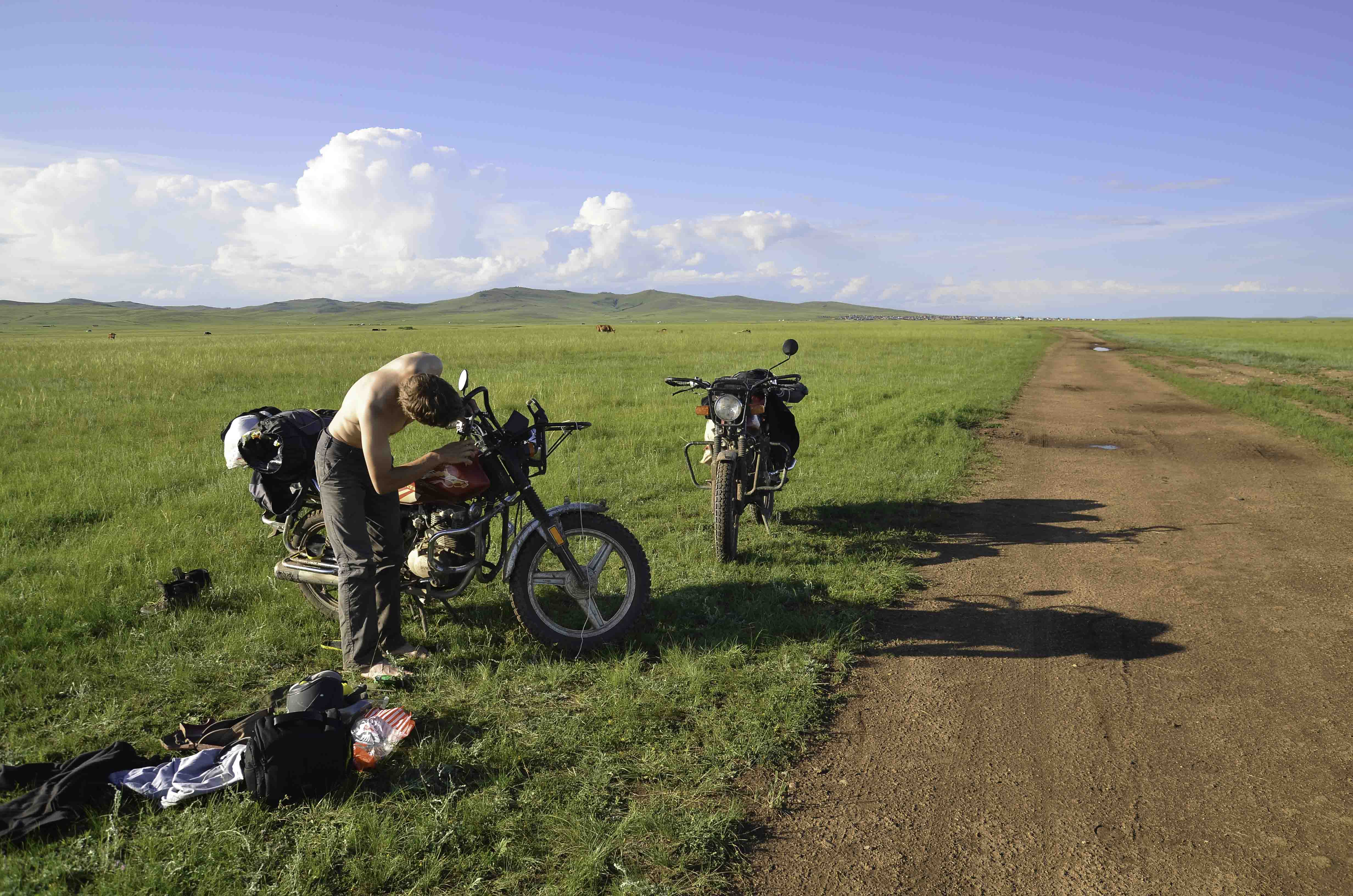
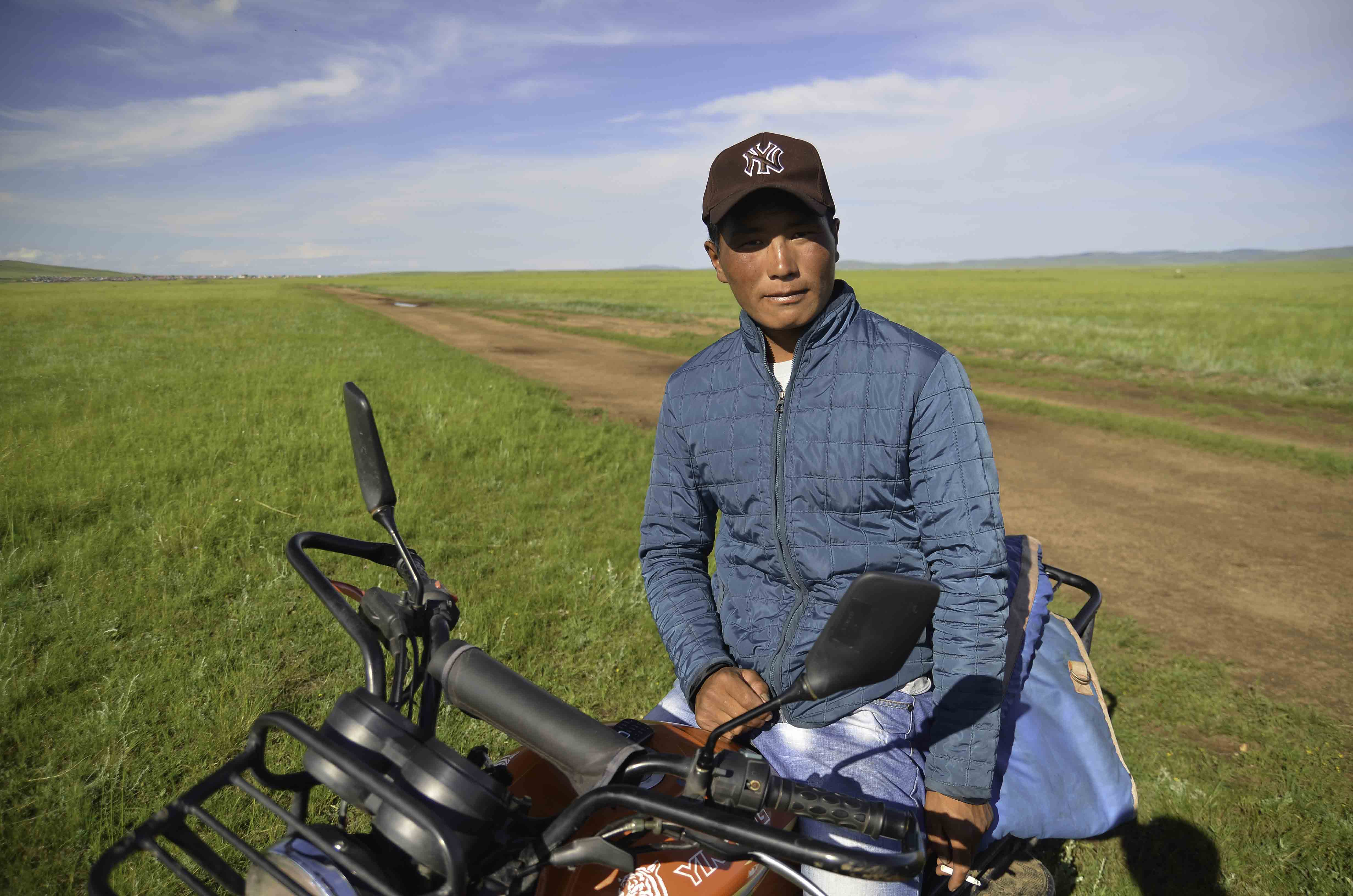
Whatever confidence we had was short-lived, however, because a major storm was coming in, filling the entire huge valley and looming over the peaks on both sides, turning the sky dark blue-black. We were crossing rivers frequently, and at one point, to avoid a bad crossing we rode into what turned out to be a mini-mogul field – grass hummocks about a foot high and two feet apart. They were almost impossibly difficult to get through because they threw the bike around savagely and any movement of our bodies tended to amplify the throttle movements in ways that we didn’t intend, so that you would get a surge of power just when you least wanted it, even if you were focused on keeping the throttle steady. We emerged on the other side both swearing that we wouldn’t make that mistake again. It was a source of considerable amusement to me to wonder if there were any mistakes that we hadn’t made; I’m sure the locals would have known to avoid every one of them.
As the storm approached, we considered stopping to take shelter in a sod-roofed cow shed that we passed, but we decided to keep going. That turned out to be another mistake, because a few kilometers further down the valley, we were caught in a storm just as we came to a river crossing that was an order of magnitude larger than any we had previously done. In previous crossings, the water had not been high enough to enter the air intake, although it had come close. It was always impressive to see the exhaust pipe, gear box and cylinder totally under water with bow waves flying from the charging bike and then to see the steaming beast emerge, still running, but on this crossing, it looked like the water might be deep enough to actually flow into the air intake. We sat there trying to figure out how to deal with it and watching the rain hit the opposite side of the valley.
The storm was moving faster than our plans, however, and while we talked, the temperature suddenly dropped about 20 degrees and it started blowing a cold, hard wind of at least 35 mph that threatened to blow our half-unpacked gear into the river, and stirred up little whitecaps on the river surface. From the strength of the wind, it was clearly a powerful storm. Lightning was hitting peaks all around us and thunder was frequent and loud, and we hastily pulled on rain gear and decided that there was (as usual) nothing for it but to keep going, so to avoid having the bike engines suck in water, we decided to push them across with the engines off. The bikes were heavy enough that it was difficult even to rock them back onto their kickstands on a flat surface, so the prospect was not a happy one. Just then, the rain hit us hard, and with it came hail. I waded in and by the time I was halfway across, the waves were lapping over the top of the seat and the bike was starting to float, and the current was pushing it down on me so hard that it was all I could do to keep it from flopping over with all of my gear on it. I hit a deep sand bar on the other side and could move neither forward nor back. With my strength ebbing, I feared that I might not even be able to hold the bike in position for long. I shouted to Mirek and he waded across, and with maximum, last-ditch effort we managed to drag my bike through the sand bank up the other side. We went back for his bike and got it across by the same method. My boots were full of wet sand by the time we were done.
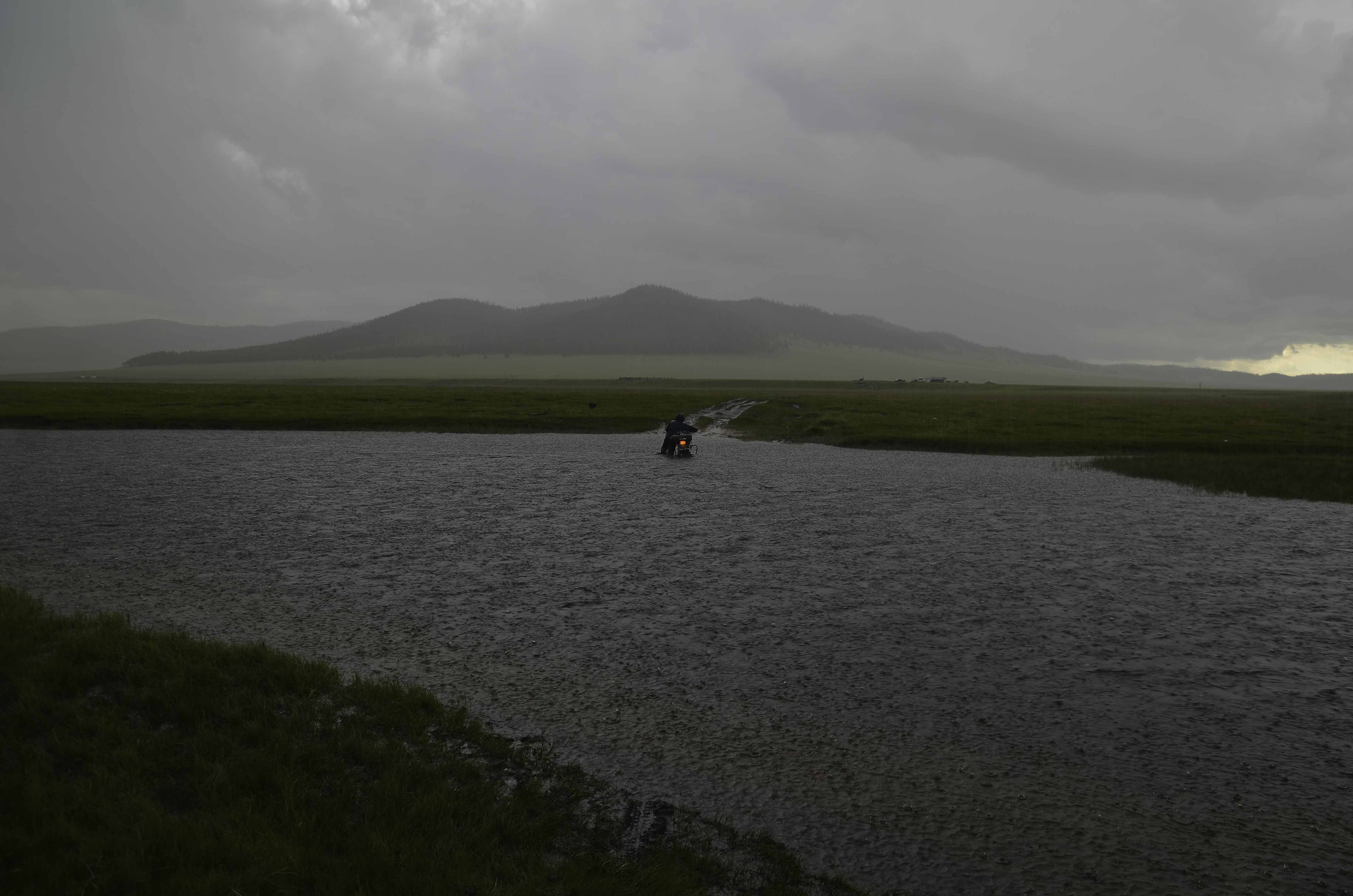
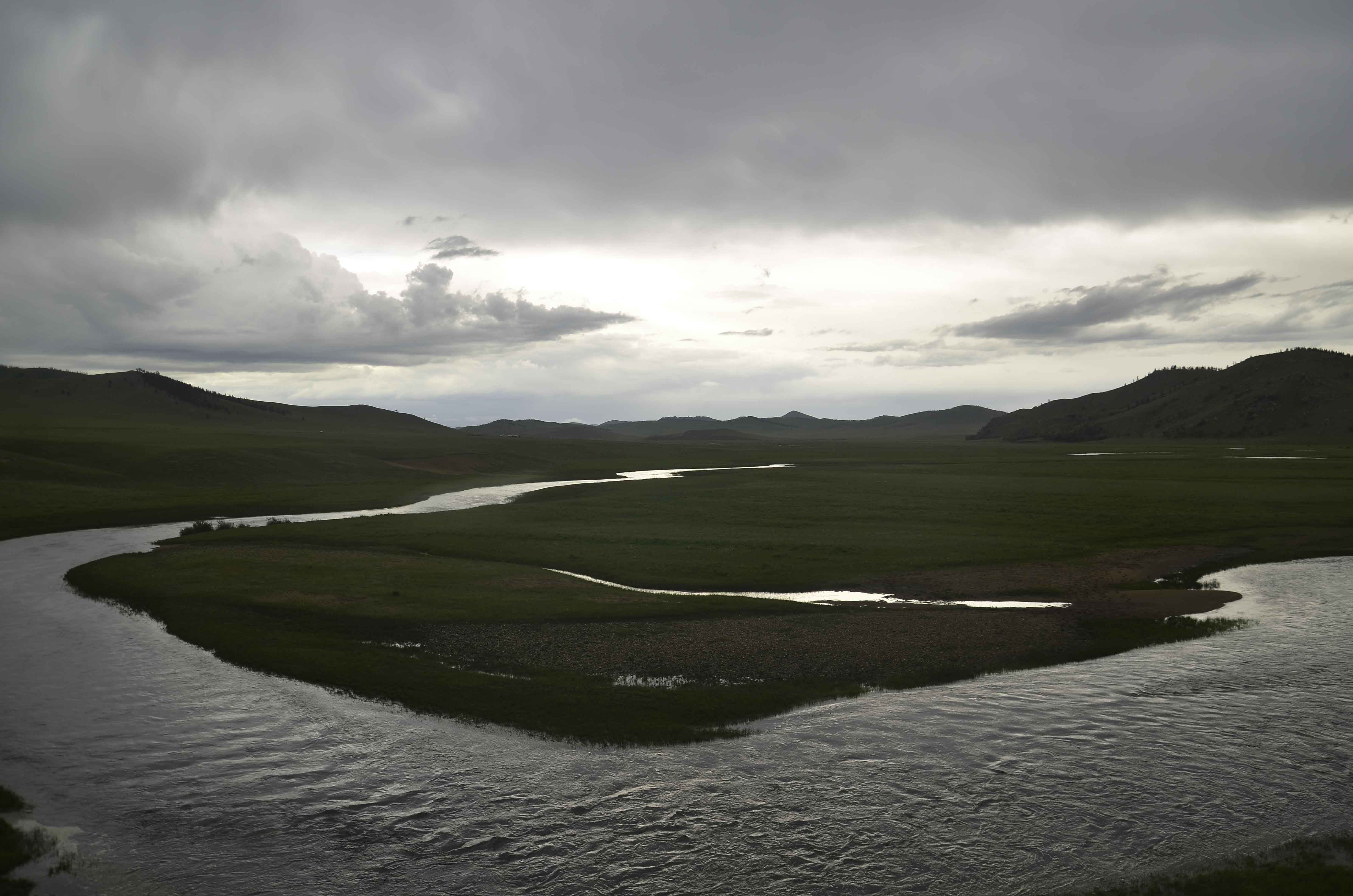
We sat in the rain on the far side, totally drained from the effort of all the riding and the falls and getting the bikes across, shivering, soaked from head to toe, and neither bike would start. It took us about an hour to get them running again. We drained the carbs, which worked on Mirek’s after about 15 minutes of cranking the engine and waiting, but it didn’t work on mine, and I was worried that the battery would die because I had bent the foot peg back in a fall and the kick-starter lever jammed against it when you tried to use it. I finally thought to dry the sparkplug on mine with a scrap of dry toilet paper, and it coughed, caught, and ran, to our great joy. The storm had gone past by the time we got the bikes running. Our sputtering steeds spouted water out of the tailpipes when they finally started (mine also jetted it from a hole in the side of the muffler, which was quite entertaining), and as we mounted, our 10-lb boots squished and sucked with every move. The sky was still dark everywhere and we could see rain and lightning around us, so it wasn’t clear if it would rain again, and we were both cold. We were very glad to have the crossing behind us, and a relief to be able to fly down the valley towards our destination at speed again, so it was an unpleasant shock to encounter a second crossing about 20 kilometers later that was just as deep. This time, though, we had the benefit of experience and so we just snapped into action and dragged the bikes across as a team. It was no less exhausting or wet or cold, but we felt a bit more in control.
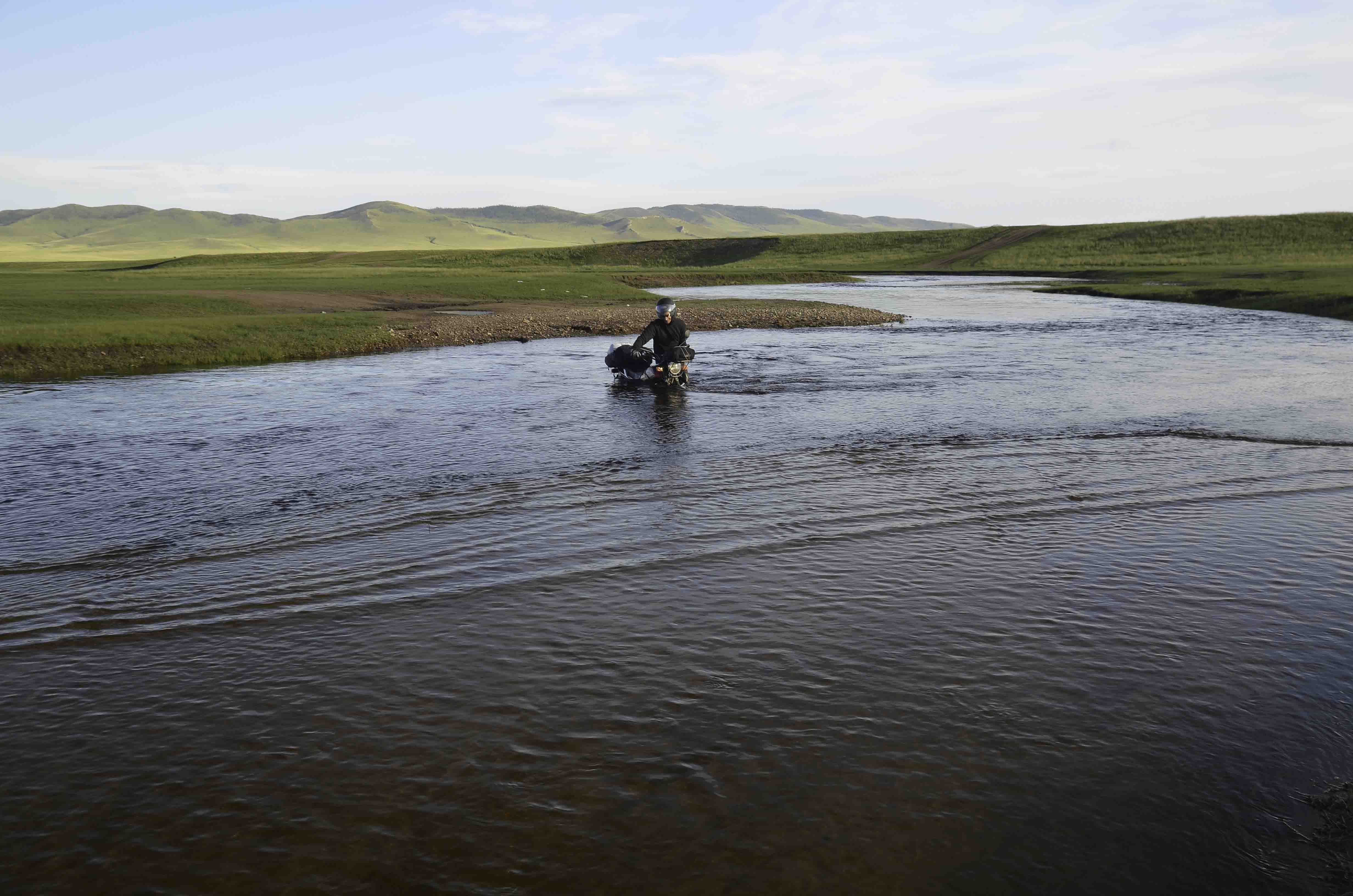
We ran down the valley until dusk through puddles and mud as far and fast as we dared. We finally, reluctantly decided to stop when I had already turned on my headlight because it was getting so dark, and we found a spot to camp that was maybe 10 ft higher than the endless, marshy valley bottom that stretched in all directions. Thankfully, the ground on the little hill was dry. Both of us and both bikes were totally covered in mud, our boots had been full of water for 3 days, my thumb was huge and painful, our legs were very bruised from multiple impacts with the bikes, and we had another night with no dinner except a Clif bar, but I had purchased 2 beers in town and so we gratefully drank those and laughed about the trip as we drifted off to sleep. We had sixty kilometers of mud to go down the valley the next day, and then hundreds of km to UB on the main road. Far up the valley as we went to sleep we could see a string of vehicles coming south, probably people heading home to UB from Naadam (“Maybe they are driving at night because they know more about the true length of the trip than we do,” I thought), and during the night a couple of them passed us, laboring along in first gear. I literally cannot imagine how any vehicle could make it across the rivers where we had crossed, so maybe they knew of better crossing places.
It rained during the night and dawned overcast and damp, but the last day grew sunnier and drier with every hour, and we ran down the remaining length of the long, beautiful valley without problems and without any more major river crossings to the town on the main road. There, we bought pastries at a little shop and bumped into a long-range Canadian bicycle tourer who grabbed onto us like a leech and wouldn’t stop talking, his intense loneliness oppressive and sad. We bought water and gas, hit the main road and roared all the way back to UB at top speed, 5 hours or so of sun and wind and noise, beautiful mountains, cloud shadows and valleys, elegant horses and bleating goats out farther, and increasing ugly towns, construction, garbage and aggressive drivers as we got closer to the big city. We stopped at a busy roadside café to eat greasy and delicious xoshor (sort of fried lamb pockets) to satisfy Mirek’s desire to try real road food, and sat in the hot sun with a bunch of curious truck drivers and a large family who organized an impromptu picnic, to which we donated our chairs. The pleasant women running the shop were working flat-out rolling dough and operating the deep-frier, and the chubby boy who collected the cash and delivered the xoshor was both efficient and fun to deal with because of his high enthusiasm for the money and the business and the hubbub.
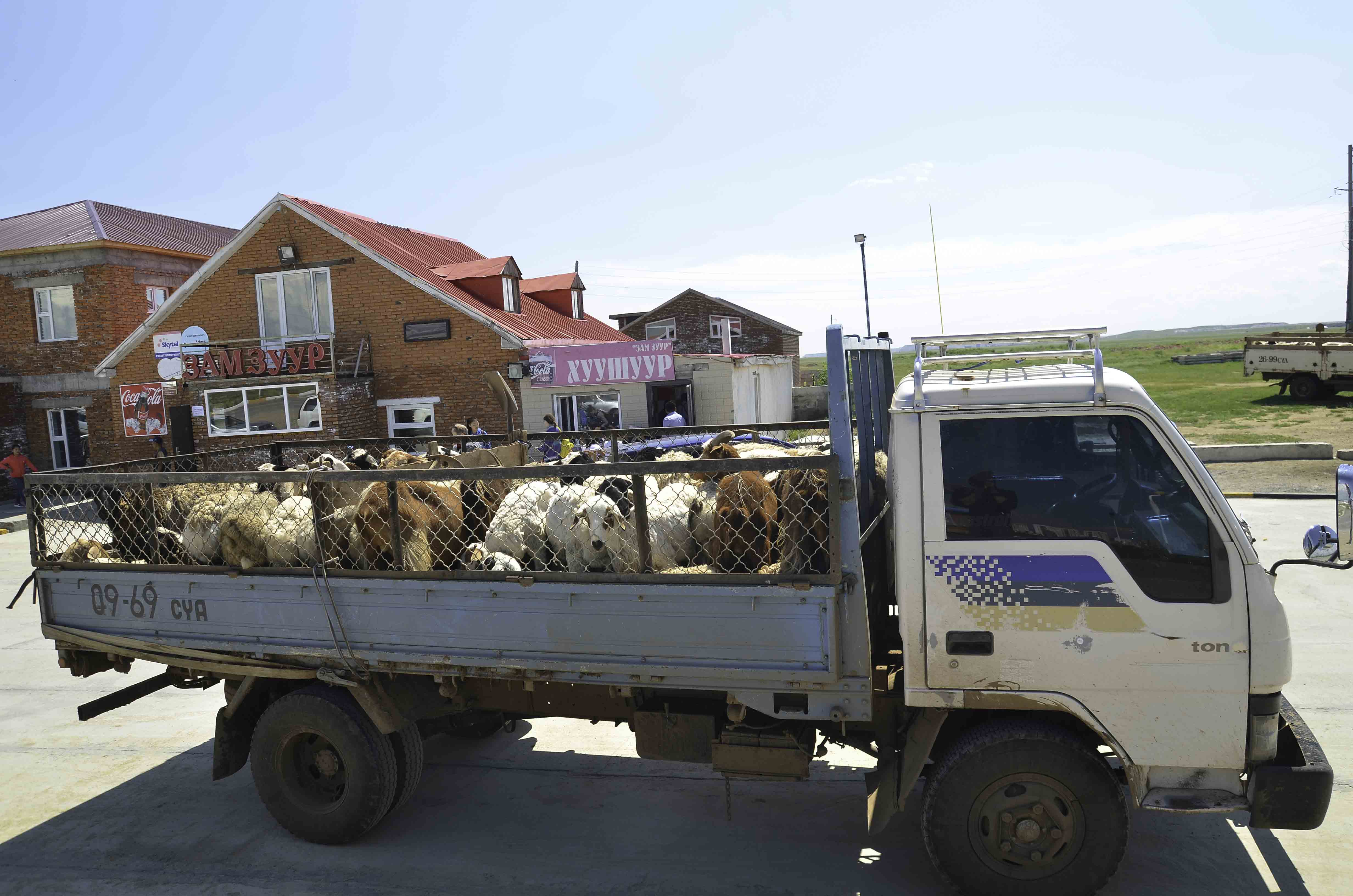
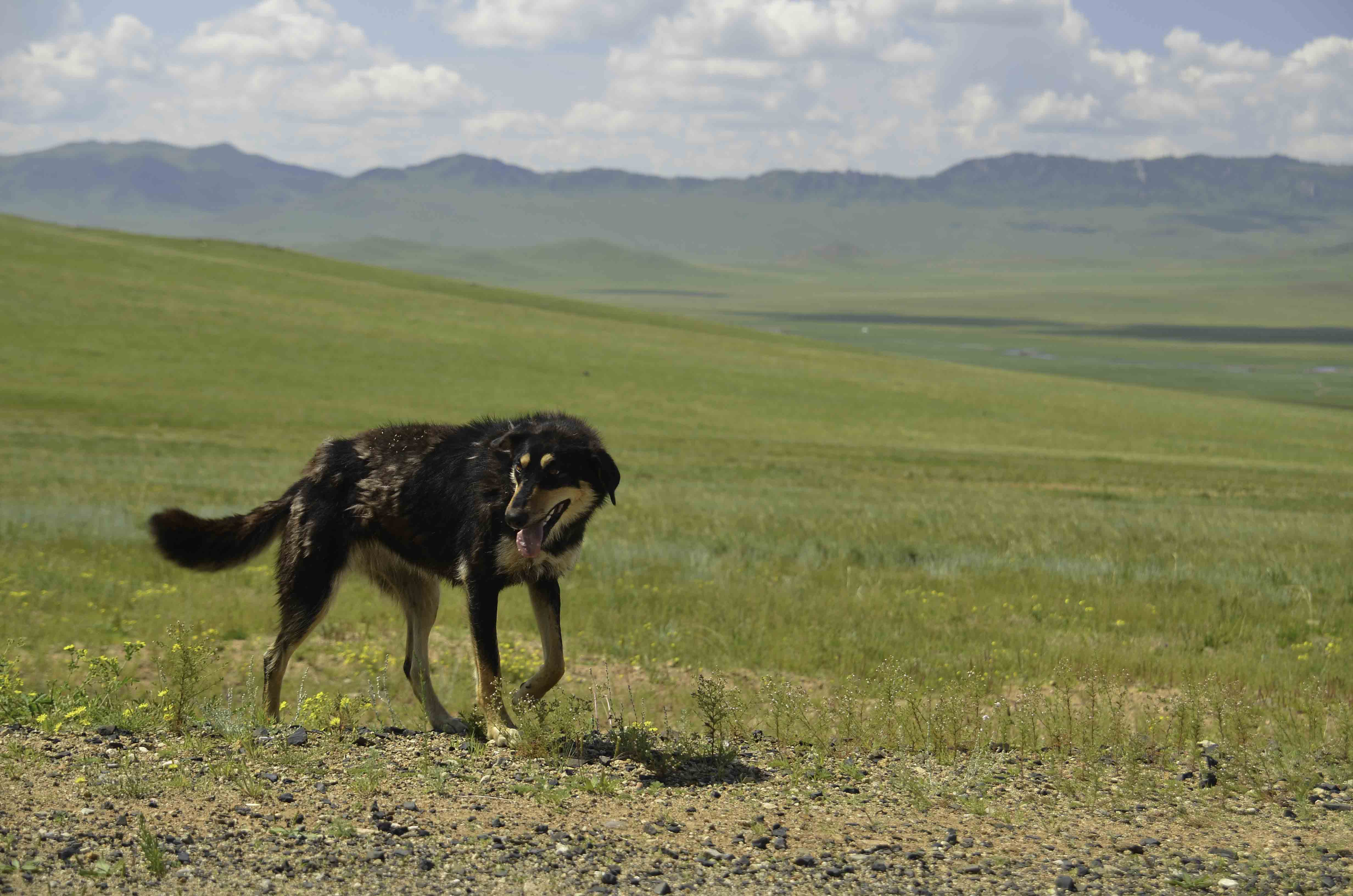
The traffic slowed to a stop as we neared the Ulaanbaatar city portal, and Mirek said “Hey, do you want to try the river road?” He was referring to a new road under construction that ran along the river. I said, “Hell, yes!” since anything beat sitting in traffic. We worked our way up to it by following our noses, expecting to be turned back at any moment. We got to a critical junction and were diverted away from the new road, which rose above us. Our path ducked under a bridge and then straight into the barrier we had hoped to avoid. A railroad ran between us and the new road, and by it, there was a gate and a guard protecting the crossing. When we asked if we could cross, he gave us a stern look and the universal “You shall not pass!” crossed-arms sign. We sighed and turned back, but as we rode under the bridge again, I heard frantic whistling from far above me on the new road, and a Mongolian guy was leaning out the door of a van way up there, gesticulating and pointing. To what?, I wondered, and then I saw that he was pointing to a culvert that passed under the railroad. It was barely big enough to fit a bike, but we were out of sight of the guard, so I figured what the hell, and plunged in. It was a bit claustrophobic, bent over the handlebars which almost touched both sides, the engine echoing in my ears, big rocks underfoot pushing the wheel around, but I made it through…and Oh dear, this won’t work, I have emerged in a cage of double barbed-wire fences…but look! A footpath about 3 feet wide wound between them. We squeezed through and we were on the new road.
The perfectly paved, brand new tar road wound along the mountains with the full Tuul river ripping along the precipitous drop below us, not a single car on it. As we got closer to the Zaisan suburb, families were swimming and picnicking by the river. We tore down the highway with the cool wind off the river in our faces, the sun at our backs and the smell of meadows in the air: glorious, perfect riding. At Zaisan, the highway finally ended, and we twisted through city streets looking for the continuation of the highway on the other side of town. Finding the second half of the highway was quite a bit harder since the end was lost in a little cluster of houses on a steep hillside, but we found it and passed a kid on a scooter trying to stay upright on the potholed road, looking like he had never ridden before. I sympathized with him for learning on that difficult surface, but no doubt it would turn him into an expert rider, like so many Mongolians.
The far half of the new highway was unpaved gravel and it looked definitely unfinished and definitely closed, with huge dump trucks coming and going in clouds of dust, but there were no obvious signs denying us entry (or if there were, we didn’t see them) and so we hesitantly ventured out on it. We stopped to talk to a guy who was walking along it, but he just smiled enigmatically and waved us onward. We decided to give it a shot, and we drove along the hills on the gravel, expecting to be turned back at any moment. We were certainly among the first non-workers to have seen the new road, and it was spectacular, winding high above the city in the foothills. The surface was quite rough still, and the riding was tricky. We were stopped on a high curve by a huge excavator loading rocks from recent blasting onto three giant dump trucks which blocked the road, and we waited for a moment until the excavator bucket was turned away from us and then shot between them. The road surface got really loose and scary coming down off the hills on the other side, but we made it down without falling.
At the very bottom, sitting on a rock under an umbrella all by himself, was a young kid, holding a ribbon across the road: our final barrier. As Mirek came down the hill, the kid dropped the ribbon and Mirek scooted across it like the winner of a race. I rode across behind him and waved, and the kid smiled shyly at me. Obviously, it was his job to drop the ribbon for the dump trucks and then hold it up for everyone else, and our improbable appearance was probably the most interesting thing that happened to him all day. We were tired but lighthearted; we had succeeded in yet another excellent adventure and had bypassed at least 20 km of the worst traffic on the planet.
We rode on out past the airport to the bike-owner’s ger, another 10 km or so in light traffic, and returned the bikes. The owner was as nice as can be despite the minor damage we had done to the bikes, and I insisted on paying her more than she asked, which made her very happy. She walked us out to the road and hailed two old guys and a kid in a tiny, beat-up car. They drove us as far as the airport entrance and a modern taxi stopped for us before we had even decided to flag one down. It took us into town smooth and fast, the perfect end to a wonderful adventure.
